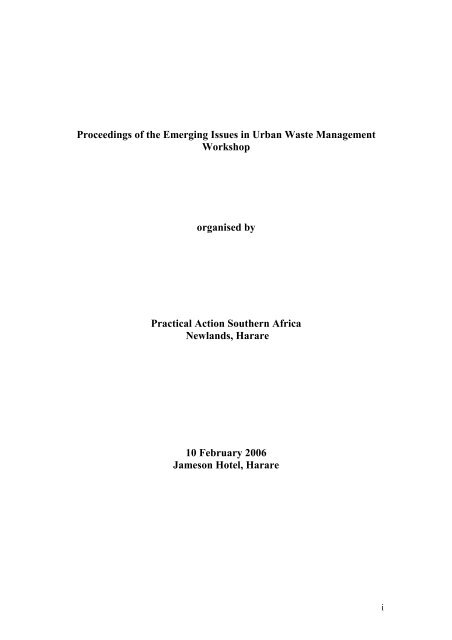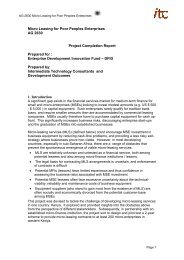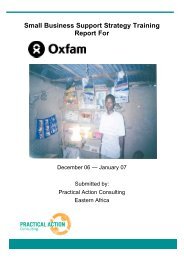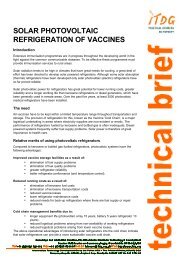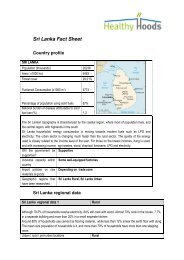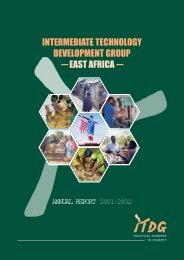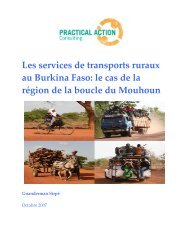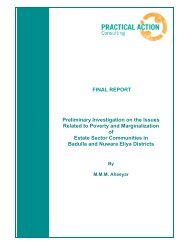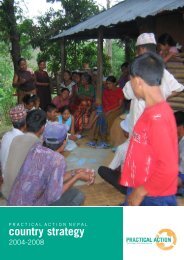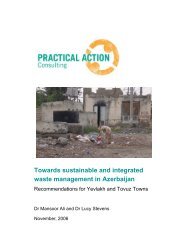Emerging Issues in Urban Waste Management ... - Practical Action
Emerging Issues in Urban Waste Management ... - Practical Action
Emerging Issues in Urban Waste Management ... - Practical Action
You also want an ePaper? Increase the reach of your titles
YUMPU automatically turns print PDFs into web optimized ePapers that Google loves.
Proceed<strong>in</strong>gs of the <strong>Emerg<strong>in</strong>g</strong> <strong>Issues</strong> <strong>in</strong> <strong>Urban</strong> <strong>Waste</strong> <strong>Management</strong><br />
Workshop<br />
organised by<br />
<strong>Practical</strong> <strong>Action</strong> Southern Africa<br />
Newlands, Harare<br />
10 February 2006<br />
Jameson Hotel, Harare<br />
i
1.0 Executive Summary.................................................................................................1<br />
2.0 Open<strong>in</strong>g Remarks.....................................................................................................3<br />
3.0 Purpose of the Workshop.........................................................................................3<br />
3.1 Background Information..........................................................................................3<br />
3.2 Causes ......................................................................................................................4<br />
3.3 Solutions ..................................................................................................................5<br />
3.4 Workshop Objectives...............................................................................................5<br />
4. Service Provision: <strong>Emerg<strong>in</strong>g</strong> <strong>Issues</strong> <strong>in</strong> <strong>Urban</strong> <strong>Waste</strong> <strong>Management</strong>...........................6<br />
4.1 Background..............................................................................................................6<br />
4.2 Local Government System.......................................................................................6<br />
4.3 <strong>Waste</strong> <strong>Management</strong> Challenges...............................................................................7<br />
4.4 Refuse Collection, Disposal and <strong>Management</strong> ........................................................7<br />
4.5 Sewerage disposal....................................................................................................8<br />
4.6 Palliative Strategies..................................................................................................9<br />
4.7 Conclusion .............................................................................................................10<br />
5. Current Challenges <strong>in</strong> <strong>Waste</strong> <strong>Management</strong> <strong>in</strong> Harare..............................................10<br />
5.1 Historical Background ...........................................................................................10<br />
5.2 Challenges..............................................................................................................10<br />
5.3 Effect of the Prevail<strong>in</strong>g Problems..........................................................................11<br />
5.4 Efforts to Address the Situation.............................................................................11<br />
6. Discussion................................................................................................................11<br />
7. Policy and Legislative Environment Govern<strong>in</strong>g <strong>Waste</strong> <strong>Management</strong> In Zimbabwe<br />
......................................................................................................................................13<br />
7.1 Introduction............................................................................................................13<br />
7.2 Laws Govern<strong>in</strong>g <strong>Waste</strong> <strong>Management</strong>....................................................................13<br />
7.3 Environmental <strong>Management</strong> Act ...........................................................................13<br />
7.3.1 <strong>Waste</strong> <strong>Management</strong>-Related Functions of the Environmental <strong>Management</strong><br />
Agency .........................................................................................................................14<br />
7.3.2 Standards for <strong>Waste</strong> ............................................................................................14<br />
7.3.3 Hazardous <strong>Waste</strong> ................................................................................................15<br />
7.3.4 Prohibition Aga<strong>in</strong>st Litter<strong>in</strong>g ..............................................................................15<br />
7.3.5 Local Environmental <strong>Action</strong> Plann<strong>in</strong>g (LEAPS) (Section 95)...........................16<br />
7.3.6 Environmental Impact Assessment (EIA) (Section 97–108)..............................16<br />
7.3.7 Drawbacks <strong>in</strong> the Enforcement of the Act..........................................................16<br />
7.4 <strong>Urban</strong> Councils Act (CAP 29:15)..........................................................................16<br />
7.5 Rural District Councils Act (CAP 29:13) ..............................................................17<br />
7.6 Water Act (Cap 20:24)...........................................................................................17<br />
7.7 Regional, Town and Country Plann<strong>in</strong>g Act (CAP 29:12) .....................................17<br />
7. Public Health Act (CAP 15:09) ...............................................................................17<br />
7.9 Policies Govern<strong>in</strong>g <strong>Waste</strong> <strong>Management</strong>................................................................17<br />
7.9.1 Environmental Impact Assessment Policy (1994)..............................................17<br />
7.9.2 National Susta<strong>in</strong>able Development Strategy (2004)...........................................18<br />
7.9.3 Draft <strong>Waste</strong> <strong>Management</strong> Strategy (2006) .........................................................18<br />
7.9.4 Science and Technology Policy (2002) ..............................................................18<br />
7.9.5 Draft National Environmental Policy (2003)......................................................18<br />
7.9.6 Problems with the Policies..................................................................................18<br />
7.10 By-Laws for <strong>Waste</strong> <strong>Management</strong> ........................................................................19<br />
7.11 Conclusion ...........................................................................................................19<br />
ii
7.12 Recommendations................................................................................................19<br />
8. Work<strong>in</strong>g with Communities <strong>in</strong> <strong>Waste</strong> <strong>Management</strong>................................................19<br />
8.1 Introduction............................................................................................................19<br />
8.2 Interaction of Community With <strong>Waste</strong>..................................................................20<br />
8.3 Challenges..............................................................................................................20<br />
8.4 Recommendations..................................................................................................21<br />
9. Community Concern and Involvement <strong>in</strong> <strong>Waste</strong> <strong>Management</strong>...............................21<br />
10. Discussion..............................................................................................................21<br />
11. Research & Research Gaps <strong>in</strong> <strong>Waste</strong> <strong>Management</strong>...............................................22<br />
11.1 Introduction..........................................................................................................22<br />
11.2 Research Gaps......................................................................................................23<br />
11.3 Recent Developments <strong>in</strong> <strong>Waste</strong> <strong>Management</strong> .....................................................23<br />
11.4 <strong>Waste</strong> <strong>Management</strong> Policies................................................................................24<br />
11.5 Recommendations................................................................................................24<br />
12. Way Forward .........................................................................................................25<br />
12.1 Network<strong>in</strong>g and Awareness Rais<strong>in</strong>g....................................................................25<br />
12.2 Lobby<strong>in</strong>g and Advocacy......................................................................................26<br />
12.3 Regulatory Framework ........................................................................................26<br />
12.4 Technology, Cleaner Production and Recycl<strong>in</strong>g .................................................26<br />
Annexes........................................................................................................................27<br />
List of Tables and Figures<br />
Fig 1 Annual variations <strong>in</strong> the number of cases for selected sanitation diseases <strong>in</strong><br />
Epworth..........................................................................................................................4<br />
Table 1 Current Fleet Disposition................................................................................11<br />
Fig 2: General Composition Of <strong>Urban</strong> <strong>Waste</strong> ( 1995-98)............................................22<br />
Fig 3: Solid <strong>Waste</strong>s Collection Trends <strong>in</strong> Harare ........................................................23<br />
iii
1.0 Executive Summary<br />
<strong>Waste</strong> <strong>Management</strong> has emerged as one of the greatest challenges fac<strong>in</strong>g local<br />
authorities throughout Zimbabwe. The volume of waste be<strong>in</strong>g generated cont<strong>in</strong>ue to<br />
<strong>in</strong>crease at a faster rate than the ability of the municipal authorities to improve on the<br />
f<strong>in</strong>ancial and technical resources needed to parallel this growth. <strong>Waste</strong> management<br />
services have <strong>in</strong>creas<strong>in</strong>gly become <strong>in</strong>adequate, as evidenced by the rise <strong>in</strong> illegal<br />
dump<strong>in</strong>g and the proliferation of the now seem<strong>in</strong>gly permanent piles of rubbish <strong>in</strong><br />
some commercial, <strong>in</strong>dustrial and residential areas of the urban areas. It is on this<br />
background that <strong>Practical</strong> Acton organised a stakeholders’ workshop to deliberate on<br />
the possible practical solutions to the waste management challenges bedevill<strong>in</strong>g the<br />
local authorities. The workshop was held at Jameson Hotel, Harare on the 10 th of<br />
February 2006.<br />
The <strong>in</strong>efficient and <strong>in</strong>adequate waste management systems obta<strong>in</strong><strong>in</strong>g <strong>in</strong> urban centres<br />
throughout the country are largely due to a number of factors among them rapid<br />
urbanization, <strong>in</strong>adequate fund<strong>in</strong>g of waste management services, frequent breakdown<br />
of refuse collection vehicles and more importantly an unstable macro-economic<br />
environment that is characterized by hyper<strong>in</strong>flation, critical shortage of foreign<br />
currency for purchas<strong>in</strong>g refuse vehicles and spare parts, lack of skilled staff and the<br />
crippl<strong>in</strong>g fuel crisis. The local government sector has also been seriously affected by<br />
the withdrawal of donor support as from 1998 ow<strong>in</strong>g to political differences between<br />
the central government and donor countries. Prior to the withdrawal of external aid,<br />
the local authorities tended to over-rely on external technical, material and f<strong>in</strong>ancial<br />
assistance through such programmes as <strong>Urban</strong> I and II, the Local Government Capital<br />
Development Programme and Deregulation Programme and the Rural District<br />
Councils Capacity Build<strong>in</strong>g Programme.<br />
Local authorities now have to rely on revenue generated from levy<strong>in</strong>g ratepayers to<br />
f<strong>in</strong>ance capital procurement, <strong>in</strong>stitutional development and meet overheads. Lessons<br />
learnt po<strong>in</strong>t to the need to reduce the over reliance on donor support. Government has<br />
had to <strong>in</strong>tervene by way of avail<strong>in</strong>g additional f<strong>in</strong>ances through the Public Sector<br />
Investment Programme (PSIP), the Reserve Bank of Zimbabwe’s Local Authorities<br />
Reorientation Programme Fund, the new Infrastructure Development Bank (IDB) and<br />
the Zimbabwe Allied Bank<strong>in</strong>g Group (ZABG). In 2005 and 2006, Local Authorities<br />
were availed a total of $286 billion and $1,1 trillion, respectively for water and<br />
sewerage projects alone under the auspices of PSIP. However Government is<br />
concerned with the budget performance of most local authorities. Whereas<br />
Government prescribes a ratio of between 28-32% of total recurrent expenditure for<br />
salaries, the majority of councils have extended to overshoot this threshold by a wide<br />
marg<strong>in</strong>. And government would want local authorities to improve <strong>in</strong> this regard.<br />
Government has <strong>in</strong> turn demanded turnaround strategies from urban local authorities.<br />
However participants expressed concern at the non-<strong>in</strong>volvement of stakeholders <strong>in</strong> the<br />
draft<strong>in</strong>g of the turnaround strategy for the city of Harare and urged the local<br />
authorities to engage stakeholders <strong>in</strong> their decision-mak<strong>in</strong>g processes.<br />
Local authorities are also be<strong>in</strong>g encouraged to get <strong>in</strong>to partnerships for service<br />
delivery with the private sector. The partnerships should also have a component of<br />
technology transfer to ensure susta<strong>in</strong>ability <strong>in</strong> the event that the partner withdraws<br />
from the agreement. Local authorities were also called upon to be <strong>in</strong>novative and<br />
1
creative <strong>in</strong> the way they management waste. There is need to explore alternative<br />
options of manag<strong>in</strong>g waste. They were urged to engage the community <strong>in</strong> waste<br />
management and also to <strong>in</strong>itiate and support waste recycl<strong>in</strong>g programmes. In a bid to<br />
improve on waste management, the City of Harare reported that it is now mov<strong>in</strong>g<br />
towards <strong>in</strong>tegrated waste management and will consider recycl<strong>in</strong>g, waste to energy<br />
conversion and compost<strong>in</strong>g as alternative ways to manage waste generated <strong>in</strong> the city.<br />
The city officials also raised concern at the late approval of budgets by the parent<br />
m<strong>in</strong>istry, which has resulted <strong>in</strong> most local authorities charg<strong>in</strong>g uneconomical tariffs<br />
thereby affect<strong>in</strong>g service provision. The official called upon central government to<br />
timorously approve budgets so that they are <strong>in</strong> sync with the economic situation<br />
prevail<strong>in</strong>g <strong>in</strong> the country. The city officials are sourc<strong>in</strong>g outside fund<strong>in</strong>g to f<strong>in</strong>ance<br />
capital equipment as the city’s waste management fleet and other associated<br />
equipment are heavily depleted. Ideally the city requires a fleet of 60 waste collection<br />
vehicles but is currently operat<strong>in</strong>g with only 13 vehicles. Participants called on the<br />
local authorities not to concentrate on refus<strong>in</strong>g collection and disposal only but to<br />
seek other options for manag<strong>in</strong>g the waste. They po<strong>in</strong>ted out the need for a national<br />
waste management policy and the accompany<strong>in</strong>g strategy and action plans.<br />
Although the legislative framework for manag<strong>in</strong>g waste is <strong>in</strong> place, concern was<br />
raised at the non-enforcement of the legislation. There appears to be an apparent<br />
reluctance by government departments and or agencies to prosecute local authorities<br />
that violate the provisions of legislation. Concern was also raised at the slow<br />
implementation of the Environmental <strong>Management</strong> Act. Although legislation provides<br />
for environmental entitlements, these rights are not enshr<strong>in</strong>ed <strong>in</strong> the constitution of<br />
Zimbabwe and are thus difficult to enforce. Moreover the <strong>in</strong>tended beneficiaries of<br />
the entitlements are not aware of these rights thus the call by participants to <strong>in</strong>crease<br />
environmental education and awareness. The Environmental <strong>Management</strong> Act makes<br />
provision for waste management standards and regulations but these are not yet <strong>in</strong><br />
place. Also current legislation emphasize on end of pipe solutions rather than on<br />
waste m<strong>in</strong>imization and prevention. Another weakness of the legislation is that f<strong>in</strong>es<br />
prescribed are low thus mak<strong>in</strong>g effective enforcement difficult given the <strong>in</strong>flationary<br />
environment.<br />
Research on waste management should focus on reduc<strong>in</strong>g waste generation at source.<br />
End of pipe solutions should be substituted by cleaner production systems thereby<br />
reduc<strong>in</strong>g waste generation at source. Research on material substitution should be<br />
undertaken to substitute non-recyclable and non-biodegradable materials with<br />
recyclables and biodegradable ones. Other waste management <strong>in</strong>itiatives such as<br />
environmental account<strong>in</strong>g and waste trad<strong>in</strong>g should also be <strong>in</strong>troduced. The need for<br />
demonstration projects to promote clean and competitive environmental management<br />
account<strong>in</strong>g for bus<strong>in</strong>ess, to account for the cost related to wasted raw materials, was<br />
po<strong>in</strong>ted out.<br />
Participants resolved to <strong>in</strong>teract further and improve on their network<strong>in</strong>g with the<br />
broad aim of f<strong>in</strong>d<strong>in</strong>g practical solutions to the waste management challenges. Four<br />
thematic areas namely, Network<strong>in</strong>g and Awareness Rais<strong>in</strong>g, Regulatory Framework,<br />
Advocacy and, Technology, Cleaner Production and Recycl<strong>in</strong>g were selected for<br />
further stakeholder engagement to come up with practical solutions.<br />
2
2.0 Open<strong>in</strong>g Remarks<br />
Mr Douglas Kativu, Programme Coord<strong>in</strong>ator, Environment Africa - Workshop<br />
Facilitator<br />
Participants were asked to <strong>in</strong>troduce themselves and highlight their work and<br />
experience <strong>in</strong> the waste management field. Below are some of the expectations of the<br />
participants:<br />
<br />
<br />
<br />
<br />
<br />
<br />
<br />
<br />
<br />
Identify<strong>in</strong>g research areas <strong>in</strong> waste management<br />
Shar<strong>in</strong>g experiences and ideas<br />
Learn more about waste management<br />
Use of waste for <strong>in</strong>come generat<strong>in</strong>g projects and energy generation<br />
Identify<strong>in</strong>g possible solutions and a comprehensive way forward to the current<br />
waste management problems<br />
The role of Geographical Information Systems and Remote sens<strong>in</strong>g <strong>in</strong> waste<br />
management<br />
Expectations of stakeholders from a local authority po<strong>in</strong>t of view<br />
How best to report on waste management and dissem<strong>in</strong>ate relevant <strong>in</strong>formation on<br />
the subject<br />
Understand the impacts of waste management<br />
After the <strong>in</strong>troductions, the workshop facilitator gave some open<strong>in</strong>g remarks with<br />
regards to waste management. The follow<strong>in</strong>g were his open<strong>in</strong>g remarks.<br />
The quality of waste management obta<strong>in</strong><strong>in</strong>g <strong>in</strong> any city depends on the resources<br />
allocated to carry<strong>in</strong>g the task and on the efficiency of their use. The resources<br />
required for an efficient waste management system <strong>in</strong>clude human, f<strong>in</strong>ancial and<br />
technical resources as well as time. However the po<strong>in</strong>t to which the situation is left to<br />
degenerate is not just a matter of technical and f<strong>in</strong>ancial aspects. Putt<strong>in</strong>g the blame on<br />
the economic situation is an easy scapegoat as it simply implies that the situation<br />
cannot be improved unless there is an economic recovery.<br />
The tolerable limit to which the situation can be left to degenerate depends on the way<br />
society views the situation. The seriousness of the problem will be <strong>in</strong>dicated by the<br />
collective efforts of all stakeholders to overcome the challenges. It is my hope that our<br />
deliberations today will enable us to move from the current closed waste management<br />
systems to <strong>in</strong>tegrated waste management systems characterized by waste material<br />
recovery, reuse and recycl<strong>in</strong>g as well as the participation of all stakeholders <strong>in</strong> the<br />
sector, particularly the community and the private sector.<br />
3.0 Purpose of the Workshop<br />
Mr T<strong>in</strong>ashe Nhete, Programme Manager, <strong>Practical</strong> <strong>Action</strong><br />
3.1 Background Information<br />
<strong>Waste</strong> management is one of the most press<strong>in</strong>g challenges confront<strong>in</strong>g urban local<br />
authorities throughout Zimbabwe. Currently, more than 2.5 million tonnes of<br />
household and <strong>in</strong>dustrial wastes are produced per annum <strong>in</strong> urban areas and this<br />
3
cont<strong>in</strong>ues to rise due to unprecedented urban growth rates and absence of waste<br />
m<strong>in</strong>imization strategies (<strong>Practical</strong> <strong>Action</strong>, 2005).<br />
Throughout the country, urban waste collection rates have dropped from at least 80%<br />
(mid 1990s) of the waste generated to as low as 30% <strong>in</strong> some large cities and small<br />
towns. Areas worst affected by erratic waste collection are low-<strong>in</strong>come residential<br />
areas such as Mbare <strong>in</strong> Harare and <strong>in</strong>formal settlements such as Jacha <strong>in</strong> Epworth,<br />
which receive no formal waste collection service at all. At least 70% of the collected<br />
waste is crudely tipped at open dumpsites 90% of which do not meet basic<br />
environmental standards (Tevera et al., 2003)<br />
The low waste collection levels and rudimentary disposal methods employed are a<br />
cause for grave concern because they trigger widespread illegal open dump<strong>in</strong>g and<br />
rampant waste burn<strong>in</strong>g, which threaten public health and pollute the environment.<br />
Common Diarrhoea<br />
Dysentry<br />
Cl<strong>in</strong>ical Malaria<br />
ARI<br />
Scabies<br />
1999 2000 2001 2002 2003 2004<br />
year<br />
1000<br />
900<br />
800<br />
700<br />
600<br />
500<br />
400<br />
300<br />
200<br />
100<br />
0<br />
mean annual no. of cases<br />
Fig 1 Annual variations <strong>in</strong> the number of cases for selected sanitation diseases <strong>in</strong><br />
Epworth<br />
Increases <strong>in</strong> recorded cases of sanitation related diseases such as diarrhea and<br />
dysentery are caused by waste mismanagement. Both diseases are closely l<strong>in</strong>ked to<br />
poor waste disposal. For all diseases analyzed, there were gradual <strong>in</strong>creases <strong>in</strong> the<br />
frequency of occurrence between 1999 and 2001 followed by steady decreases <strong>in</strong><br />
2002. However, s<strong>in</strong>ce 2003, sharp <strong>in</strong>creases were recorded and this is very worrisome.<br />
3.2 Causes<br />
The deterioration <strong>in</strong> the performance of the waste management systems is due to<br />
several factors which <strong>in</strong>clude rapid urbanization, <strong>in</strong>adequate fund<strong>in</strong>g of waste<br />
management services, frequent breakdown of refuse collection vehicles and more<br />
importantly an unstable macro-economic environment that is characterized by<br />
hyper<strong>in</strong>flation, critical shortage of foreign currency for purchas<strong>in</strong>g refuse vehicles and<br />
4
spare parts, lack of skilled staff and the crippl<strong>in</strong>g fuel crisis. Huge volumes of waste<br />
are be<strong>in</strong>g produced at a rate that is faster than the capacity of local authorities to<br />
manage. There is now a mismatch between the waste generation rate and the ability to<br />
manage the waste. The general lack of management capacities on the part of the local<br />
authorities also expla<strong>in</strong>s the deterioration of the systems.<br />
Largely due to the above constra<strong>in</strong>ts, waste management systems <strong>in</strong> the country are<br />
<strong>in</strong>efficient, economically unsusta<strong>in</strong>able and socially undesirable. Local authorities<br />
may not be aware of the quantities of domestic and <strong>in</strong>dustrial wastes generated. The<br />
refuse charges are not a reflection of the quantities generated or the cost of service<br />
provision. Lack of adequate statistical data makes it very difficult to plan and improve<br />
quality of waste services offered. <strong>Waste</strong> collection has virtually collapsed trigger<strong>in</strong>g<br />
rampant waste dump<strong>in</strong>g. Chaotic solid wastes disposal puts the health of residents at<br />
great risk. <strong>Waste</strong> dumps are a source of environmental problems such as odors and<br />
smoke emissions. Open waste dumps are prime breed<strong>in</strong>g sites for houseflies, rats and<br />
mosquitoes and other vectors of communicable diseases such as fever, dysentery,<br />
diarrhea, and malaria.<br />
3.3 Solutions<br />
The follow<strong>in</strong>g are suggested solutions to the problem:<br />
<br />
<br />
<br />
<br />
<br />
<br />
<br />
<br />
Engagement of all stakeholders <strong>in</strong> fora such as this one and be<strong>in</strong>g open and<br />
s<strong>in</strong>cere<br />
Community participation and <strong>in</strong>volvement of Community Based Organizations <strong>in</strong><br />
waste management<br />
Integrated waste management systems-generation to disposal<br />
Economic susta<strong>in</strong>ability- charge cost recovery refuse fees<br />
Elim<strong>in</strong>ate illegal waste dumps-prioritize areas with high population densities<br />
Organic waste fertilizer-urban agricultural plots<br />
Capacity build<strong>in</strong>g of micro-enterprises that <strong>in</strong>tend to or are already <strong>in</strong>volved <strong>in</strong><br />
waste recovery, reuse and recycl<strong>in</strong>g<br />
Exploration of technology driven <strong>in</strong>terventions that may make the enterprises<br />
more viable<br />
3.4 Workshop Objectives<br />
Hav<strong>in</strong>g outl<strong>in</strong>ed the waste management challenges and impacts the ma<strong>in</strong> objective of<br />
this workshop is to create a platform for creative and purposeful stakeholder<br />
engagement <strong>in</strong> order to come up with practical solutions to the waste management<br />
challenges. Focus is not on apportion<strong>in</strong>g blame but on collectively explor<strong>in</strong>g ways to<br />
solve the problems. This workshop is also meant to stimulate engagement of all<br />
stakeholders <strong>in</strong> waste management. There is need for stakeholder appreciation and<br />
stakeholder contribution <strong>in</strong> the quest to f<strong>in</strong>d last<strong>in</strong>g solutions.<br />
5
4. Service Provision: <strong>Emerg<strong>in</strong>g</strong> <strong>Issues</strong> <strong>in</strong> <strong>Urban</strong> <strong>Waste</strong> <strong>Management</strong><br />
Mr J. Chikuruwo, M<strong>in</strong>istry of Local Government, Public Works And <strong>Urban</strong><br />
Development, Government of Zimbabwe<br />
4.1 Background<br />
The past 5 years have been severely try<strong>in</strong>g on Local Authorities’ management<br />
systems, primary social services <strong>in</strong>frastructural development, municipal services<br />
delivery, plann<strong>in</strong>g and organization. There has been a general deterioration of primary<br />
social services and related <strong>in</strong>frastructure such as water and sewerage reticulation<br />
systems, roads, street and traffic light<strong>in</strong>g and refuse removal plant and equipment.<br />
Key services such as water treatment and supplies, sewerage treatment and safe<br />
disposal, refuse collection, management and disposal; low-cost hous<strong>in</strong>g provision;<br />
construction and ma<strong>in</strong>tenance of the road network and dra<strong>in</strong>age systems and, the<br />
development and ma<strong>in</strong>tenance of public social amenities such as public halls, sport<strong>in</strong>g<br />
facilities, municipal, gardens and even beer halls; have not been sufficiently attended<br />
to by the majority of Local Authorities over the past few years. A major reason for<br />
this neglect by Local Authorities and other stakeholders has been the void expectation<br />
that somebody would takeover the capital development and <strong>in</strong>stitutional<br />
transformation responsibilities and cont<strong>in</strong>ue from where the erstwhile external<br />
agencies left off at the turn of the century (1998-2002).<br />
The predom<strong>in</strong>ance of external assistance on our development arena seems to have<br />
<strong>in</strong>duced a worrisome degree of lethargy on our <strong>in</strong>stitutions of development and, it<br />
should be our collective resolve to eradicate this mentality completely so that we<br />
become masters of our dest<strong>in</strong>y. Prior to the donor flight period, our systems and<br />
<strong>in</strong>stitutions, <strong>in</strong>clusive of Local Authorities, have tended to over-rely on external<br />
technical, material and f<strong>in</strong>ancial assistance through such programmes as <strong>Urban</strong> I and<br />
II, the Local Government Capital Development Programme and, Deregulation<br />
Programme; the Rural District Councils Capacity Build<strong>in</strong>g Programme and<br />
CAMPFIRE.<br />
Presently, the majority of development stakeholders have s<strong>in</strong>ce learnt the hard way<br />
that over-reliance on external assistance at any level and for any purpose is a tendency<br />
that is pregnant with severe peril. Indeed, to the extent that assistance <strong>in</strong> certa<strong>in</strong><br />
respects is significant, the omnipotent lesson that we must learn is that the assisted or,<br />
receiver of assistance, must have a major stake of resources <strong>in</strong> such jo<strong>in</strong>t projects and<br />
programmes.<br />
4.2 Local Government System<br />
Zimbabwe basically operates a decentralized local government system that is<br />
pr<strong>in</strong>cipally guided by the <strong>Urban</strong> Councils Act [Cap. 29:15], the Regional, Town and<br />
Country Plann<strong>in</strong>g Act [Cap. 29:12], the Prov<strong>in</strong>cial Councils and Adm<strong>in</strong>istration Act<br />
[Cap.29: 11], and the Local Authorities Election Laws Amendment Act No. 21 of<br />
1997 (Electoral Act [Cap.2: 13]). The essence of a decentralized local government<br />
system is to, <strong>in</strong>ter alia, br<strong>in</strong>g the citizenry close to decision mak<strong>in</strong>g processes and<br />
allow participation <strong>in</strong> the selection of office bearers, conceptualization and<br />
6
implementation of development projects and programmes and <strong>in</strong>duce that<br />
<strong>in</strong>dispensable sense of ownership <strong>in</strong> respect of f<strong>in</strong>ancial, human and material<br />
resources through the development of compatible policies, regulations and statutes. At<br />
the same time, Government is mandated to make available such resources as may be<br />
at its disposal <strong>in</strong> order to assist Local Authorities <strong>in</strong> their developmental priorities.<br />
4.3 <strong>Waste</strong> <strong>Management</strong> Challenges<br />
The management of refuse/garbage/trash from domestic, commercial and <strong>in</strong>dustrial<br />
activities as well as sewerage disposal constitutes a traditional and critical component<br />
of Local Authorities’ mandate. By virtue of their bulky and poisonous nature when<br />
<strong>in</strong>appropriately handled, refuse and sewerage waste require specialized mechanical<br />
plant and equipment, specialized technical skill and, a huge f<strong>in</strong>ancial outlay,<br />
particularly <strong>in</strong> modern urban environments with high population densities and<br />
competition for land uses. Appropriate disposal techniques also have to be applied<br />
and, <strong>in</strong> some countries, through appropriate technologies, waste is recycled for energy<br />
and other profitable uses.<br />
In an economy that heavily relies on agriculture, different seasons br<strong>in</strong>g about<br />
different types of waste for which the authorities should be well equipped to deal<br />
with. By similar token, a highly <strong>in</strong>dustrialized economy generates tox<strong>in</strong>s of its own<br />
k<strong>in</strong>d and also, to be dealt with by different modalities.<br />
4.4 Refuse Collection, Disposal and <strong>Management</strong><br />
Local authorities have been experienc<strong>in</strong>g serious technical and f<strong>in</strong>ancial resource<br />
<strong>in</strong>adequacies to meet their refuse collection and disposal mandate. This has been due<br />
to under-perform<strong>in</strong>g annual budgets, the <strong>in</strong>adequacies of relevant plant and<br />
equipment, spares and, foreign currency to procure equipment and spares from<br />
abroad. Also lack<strong>in</strong>g has been the propensity to generate new and viable ideas to meet<br />
the challenge imposed by a harsh macroeconomic environment and, the apparent<br />
lethargy <strong>in</strong> forg<strong>in</strong>g partnerships with potential <strong>in</strong>vestors <strong>in</strong> the refuse collection,<br />
disposal and management bus<strong>in</strong>ess.<br />
Some Local Authorities have previously attempted to subcontract the service to<br />
private players but, <strong>in</strong> cases, this has failed due to the unprofitable nature of the<br />
bus<strong>in</strong>ess, <strong>in</strong>efficiency and dishonesty on the part of some of the contractors and, late<br />
payment of contractors by the local Authorities and other plann<strong>in</strong>g factors. Members<br />
of the general public have also done themselves a lot of disservice by fail<strong>in</strong>g to adopt<br />
and nurture a culture of cleanl<strong>in</strong>ess around streets. On the other hand, the enforcement<br />
of anti-litter and refuse collection and management by-laws by Local Authorities has<br />
been weak due to limited manpower levels. The absence of municipal courts<br />
specifically charged with the responsibility of try<strong>in</strong>g and met<strong>in</strong>g out punishment on<br />
municipal law offenders has been yet another h<strong>in</strong>drance on the war aga<strong>in</strong>st garbage<br />
disposal control <strong>in</strong> most urban areas.<br />
In addition, the absence of arrest<strong>in</strong>g powers on the municipal police has severely<br />
compromised their effectiveness <strong>in</strong> br<strong>in</strong>g<strong>in</strong>g to book municipal offenders as the<br />
prevail<strong>in</strong>g scenario is such that, apart from issu<strong>in</strong>g tickets, they merely exercise<br />
7
citizen’s arrest powers without necessarily deal<strong>in</strong>g with offences decisively and<br />
conclusively.<br />
The volatile economic environment, has also <strong>in</strong>duced immense difficulty <strong>in</strong> the<br />
budget<strong>in</strong>g and plann<strong>in</strong>g process of Local Authorities result<strong>in</strong>g <strong>in</strong> <strong>in</strong>sufficient capital<br />
funds be<strong>in</strong>g devoted towards such critical areas as refuse removal, disposal and<br />
management. Whereas Government prescribes a ratio of between 28-32% of total<br />
recurrent expenditure for salaries, the majority of councils have extended to overshoot<br />
this threshold by a wide marg<strong>in</strong> due to the pressure exerted by employees on<br />
respective Council budgets.<br />
The obvious solution to tackle budgetary constra<strong>in</strong>ts by local authorities would be to<br />
enhance the revenue base by explor<strong>in</strong>g new and viable sources of revenue base by<br />
explor<strong>in</strong>g new and viable sources of revenue as opposed to becom<strong>in</strong>g <strong>in</strong>creas<strong>in</strong>gly<br />
reliant on traditional revenue sources such as supplementary rates, service charges,<br />
fees and levies.<br />
4.5 Sewerage disposal<br />
Due to largely obsolete reticulation <strong>in</strong>frastructure and population pressure <strong>in</strong> most<br />
urban areas, sewerage bursts around residential areas and, its disposal <strong>in</strong>to water<br />
sources has also been a major problem of late. The absence of forward plann<strong>in</strong>g and,<br />
<strong>in</strong>deed, the proliferation of residential areas without proportional expansion of the<br />
primary social services <strong>in</strong>frastructure are the factors that have duly contributed to the<br />
current sewerage woes.<br />
The withdrawal of external technical, f<strong>in</strong>ancial and material assistance at the turn of<br />
the century also resulted <strong>in</strong> major sewerage reticulation and the Biological Nutrient<br />
removal plant projects be<strong>in</strong>g left <strong>in</strong> abeyance because the capital requirements far<br />
outweighed the resources that wee available. However government had to <strong>in</strong>tervene<br />
by way of avail<strong>in</strong>g additional f<strong>in</strong>ances through the Public Sector Investment<br />
Programme (PSIP), the Reserve Bank of Zimbabwe’s Local Authorities Reorientation<br />
Programme funds, the new Infrastructure Development Bank (IDB) and of late, the<br />
Zimbabwe Allied Bank<strong>in</strong>g Group (ZABG). For example, <strong>in</strong> 2005 and 2006, Local<br />
Authorities were availed a total of $286 billion and $1,1 trillion, respectively for<br />
water and sewerage projects alone under the auspices of PSIP.<br />
Additional funds still need to be mobilized to rehabilitate most of the reticulation and<br />
treatment <strong>in</strong>frastructure and, it is <strong>in</strong> this context that partnerships between the State,<br />
Local authorities and the private sector have to be firmly established. The technical<br />
competencies as well as <strong>in</strong>stitutional management systems at local Authorities also<br />
have to be revamped to meet current developmental challenges and foster the spirit of<br />
commitment, resourcefulness and competitiveness. Streaml<strong>in</strong><strong>in</strong>g of the structures at<br />
respective Councils and provid<strong>in</strong>g attractive conditions of service would also assist <strong>in</strong><br />
lur<strong>in</strong>g desirable competencies thereat. Transparency and accountability <strong>in</strong> the<br />
management of available f<strong>in</strong>ancial resources is also imperative, let alone, the support<br />
and commitment of the communities, which, <strong>in</strong> essence, are the ultimate beneficiaries<br />
of these <strong>in</strong>itiatives.<br />
8
4.6 Palliative Strategies<br />
Guided by the government policy framework called Zimbabwe: Towards Susta<strong>in</strong>ed<br />
Economic Growth- Macroeconomic Framework for 2005-2006, which, <strong>in</strong>ter alia,<br />
places emphasis on agricultural <strong>in</strong>tensification, <strong>in</strong>vestment promotion, employment<br />
creation, economic <strong>in</strong>tegration and improved <strong>in</strong>frastructural development, we have<br />
s<strong>in</strong>ce 2003, assisted Local Authorities to devise and implement strategic turnaround<br />
programmes.<br />
The plans also came about as a result of the Local Authorities Revitalization Policy<br />
Strategy that Government Adopted <strong>in</strong> 2004 and, upon which the f<strong>in</strong>anc<strong>in</strong>g w<strong>in</strong>dow by<br />
the Reserve Bank of Zimbabwe, that is the Parastatals and Local Authorities<br />
Reorientation Programme (PLARP) is essentially anchored. The monetary and fiscal<br />
policies from the reserve bank and the M<strong>in</strong>istry of F<strong>in</strong>ance, respectively, together with<br />
the revitalization that we have <strong>in</strong>stituted on Local Authorities also assist <strong>in</strong> achiev<strong>in</strong>g<br />
susta<strong>in</strong>able developmental projects and programmes at local authorities.<br />
The Revitalization of Local Authorities Strategy basically <strong>in</strong>tends to address the<br />
<strong>in</strong>stitutional, capital and technical <strong>in</strong>adequacies that have s<strong>in</strong>ce become rampant at<br />
Councils. The Strategy also entices Government to sharpen its focus on the<br />
rehabilitation of primary social services <strong>in</strong>frastructure. Government has also s<strong>in</strong>ce<br />
adopted a new and results guaranteed f<strong>in</strong>ancial plann<strong>in</strong>g modality called Results<br />
Based <strong>Management</strong> (RBM) where the scarce resources at the disposal of the State<br />
Enterprises and Parastatals, <strong>in</strong>clusive of Local Authorities, have to be judiciously<br />
applied <strong>in</strong> such a manner that tangible results have to be accord<strong>in</strong>gly registered from<br />
any amount of public resources so availed.<br />
Robust f<strong>in</strong>ancial account<strong>in</strong>g approaches and transparency <strong>in</strong> the management of the<br />
given resources have to be established through material achievements as planned and<br />
agreed at the commencement of the year between the m<strong>in</strong>istry and respective Local<br />
Authorities as given <strong>in</strong> the budgets. Effective management of resources set aside for<br />
waste management will be closely monitored <strong>in</strong> accordance with the project<br />
implementation plans that are presently be<strong>in</strong>g received from local Authorities.<br />
In view of the paucity of resources aris<strong>in</strong>g from both Government and Local<br />
Authorities through the ratepayers; partnerships with f<strong>in</strong>ance houses and the bus<strong>in</strong>ess<br />
world locally, regionally and <strong>in</strong>ternationally would assist <strong>in</strong> the effective management<br />
of refuse and the treatment of sewerage. The ultimate manifestation of municipal<br />
courts would deter reckless behavior related to waste management by residents of and<br />
ratepayers of any given Local Authority. In addition, the conferment of arrest<strong>in</strong>g<br />
powers on the municipal police would also give them sufficient legal clout to<br />
prosecute municipal offenders <strong>in</strong>sofar as common litter is concerned. The<br />
strengthen<strong>in</strong>g of the legislative framework and relevant legal <strong>in</strong>struments such as<br />
local by-laws to impose sufficiently deterrent penalties on municipal offenders is also<br />
essential.<br />
At the community level, it would also be significant to have organized groups<br />
work<strong>in</strong>g closely with Local Authorities to put <strong>in</strong> place measures that enable them to<br />
coord<strong>in</strong>ate the safe disposal and management of garbage aris<strong>in</strong>g from residential<br />
areas. Improvis<strong>in</strong>g simple technological implements such as push carts and the<br />
9
employment of relevant personnel to cart away trash could be one <strong>in</strong>itiative. Local<br />
Authorities should also make earnest efforts to revamp their plant and equipment <strong>in</strong><br />
order to tackle the menace of improperly disposed waste, be it solid or liquid.<br />
4.7 Conclusion<br />
The m<strong>in</strong>istry rema<strong>in</strong>s committed to assist<strong>in</strong>g Local Authorities and other stakeholders<br />
<strong>in</strong> devis<strong>in</strong>g and implement<strong>in</strong>g such projects and programmes as may result <strong>in</strong> the<br />
improvement of waste collection, disposal and management. More significantly<br />
would be to design, with appropriate technologies, modalities by which the waste<br />
generated from domestic and <strong>in</strong>dustrial activity could be recycled for other purposes<br />
and to contribute towards improvement of the socio-economic well be<strong>in</strong>g of the<br />
citizenry.<br />
Also significant is the idea of creat<strong>in</strong>g <strong>in</strong>vestment portfolios at Councils, which would<br />
be responsible for strategiz<strong>in</strong>g on <strong>in</strong>come generation ventures as provided at Section<br />
221 of the <strong>Urban</strong> Councils Act [Cap. 29:15]. A focused and competently manned<br />
<strong>in</strong>vestment portfolio at Council has the potential of specializ<strong>in</strong>g on projects and<br />
programmes that would expand the revenue base of Council while at the same time,<br />
concentrat<strong>in</strong>g on lur<strong>in</strong>g <strong>in</strong>vestment <strong>in</strong>to the council’s area of jurisdiction.<br />
In this respect, the <strong>in</strong>itiatives at Harare City Council, to manifest strategic bus<strong>in</strong>ess<br />
units that focus on key service delivery aspects such as waste management and<br />
sewerage works, is worth the support of all stakeholders.<br />
5. Current Challenges <strong>in</strong> <strong>Waste</strong> <strong>Management</strong> <strong>in</strong> Harare<br />
Mr E. Muza, Amenities Manager, <strong>Waste</strong> <strong>Management</strong> Department, City of Harare<br />
5.1 Historical Background<br />
Responsibility for waste management has changed hands from one department to<br />
another with<strong>in</strong> the City of Harare. Before 1996, the Department of Works was<br />
responsible for waste management <strong>in</strong> the city. This responsibility was transferred to<br />
the City Health Department <strong>in</strong> after 1996. It was dur<strong>in</strong>g this period that the local<br />
authority contracted out 56% of refuse collection to some private companies with the<br />
local authority reta<strong>in</strong><strong>in</strong>g responsibility for the rema<strong>in</strong><strong>in</strong>g 44%. After the adoption of<br />
the local authority’s strategic turnaround plan <strong>in</strong> 2004, a stand alone waste<br />
management entity was established. Currently the city council is at an advanced stage<br />
of unbundl<strong>in</strong>g service units.<br />
5.2 Challenges<br />
The local authority is fac<strong>in</strong>g a number of challenges <strong>in</strong> fulfill<strong>in</strong>g its mandate of<br />
service delivery. The city now has to cope with a population of 3 million <strong>in</strong>habitants.<br />
The city has also been affected by the macro economic situation prevail<strong>in</strong>g <strong>in</strong> the<br />
country and has not been able to source foreign currency to replace old plant and<br />
equipment required for waste management. The late approval of budgets by the parent<br />
m<strong>in</strong>istry has also resulted <strong>in</strong> cash flow problems. All this has resulted <strong>in</strong> the lack of<br />
10
f<strong>in</strong>ancial resources to recapitalise and rehabilitate plant and equipment. Ideally the<br />
city requires about 60 refuse collection compactor vehicles but only 13 are operational<br />
(Table 1).<br />
Table 1 Current Fleet Disposition<br />
Operational Broken Down Ideal<br />
Compactor Trucks 13 10 60<br />
Skip Trucks 1 1 6<br />
Tipper Truck 0 1 6<br />
Tractors 3 4 20<br />
Front End Loaders 0 1 2<br />
Dozer 0 1 1<br />
Landfill Compactors 0 1 1<br />
The situation has been worsened by fuel shortages. Private refuse contractors have<br />
also withdrawn their services cit<strong>in</strong>g the harsh macro economic environment. The city<br />
council also requires an <strong>in</strong>c<strong>in</strong>erator for the disposal of Medical and Hazardous <strong>Waste</strong>.<br />
5.3 Effect of the Prevail<strong>in</strong>g Problems<br />
The ma<strong>in</strong> effect of the depress<strong>in</strong>g situation as outl<strong>in</strong>ed above has been the<br />
erratic/irregular collection of refuse with<strong>in</strong> the city. This has resulted <strong>in</strong> the<br />
<strong>in</strong>discrim<strong>in</strong>ate/illegal dump<strong>in</strong>g of waste by residents and the subsequent aesthetic<br />
<strong>in</strong>trusions. The non-collection of refuse has also resulted <strong>in</strong> an outcry by the<br />
ratepayers who are demand<strong>in</strong>g for improved service provision.<br />
5.4 Efforts to Address the Situation<br />
Despite the challenges <strong>in</strong> service provision, the city council is hard pressed to operate<br />
with<strong>in</strong> the dictates of the Environmental <strong>Management</strong> Act (Cap 20:27). The city<br />
council has embarked on a turn around strategy, which seeks among other th<strong>in</strong>gs, to<br />
improve on service delivery and efficiency. The council will also beg<strong>in</strong> charg<strong>in</strong>g cost<br />
effective and economic tariffs for services rendered. The council is also seek<strong>in</strong>g<br />
outside fund<strong>in</strong>g to recapitalise its fleet, plant and equipment and has received a<br />
favourable response from the Government of the Republic of Iran. The authorities are<br />
also explor<strong>in</strong>g <strong>in</strong>tegrated waste management systems, which will <strong>in</strong>clude waste<br />
recycl<strong>in</strong>g and waste conversion through strategic partnerships with corporate world.<br />
6. Discussion<br />
It was po<strong>in</strong>ted out that refuse collection and disposal does not constitute waste<br />
management and there is need for local authorities to consider the other components<br />
of waste management such as reduction at source, recycl<strong>in</strong>g, material and nutrient<br />
recovery. Participants impressed on the need for local authorities to adopt alternative<br />
strategies such as the <strong>in</strong>tegrated waste management system <strong>in</strong>, which recycl<strong>in</strong>g plays a<br />
major role, as opposed to the current closed loop system. Emphasis should be on<br />
waste reduction at source so as to reduce the volumes that have to be collected,<br />
11
transported and then disposed of. Concern was raised that the solutions proffered by<br />
the city council, of technical <strong>in</strong>vestments, were so as to ma<strong>in</strong>ta<strong>in</strong> the current ways of<br />
manag<strong>in</strong>g waste, which give much attention to refuse collection and there is need to<br />
consider other options of manag<strong>in</strong>g the waste.<br />
A call was made for the country to develop a national waste management policy that<br />
will be complete with a vision, mission, strategy and action plans. The strategy should<br />
be based on creativity and should be results driven. It was noted that some of the<br />
current waste management challenges are due to lack of creativity by the responsible<br />
authorities. Stakeholders also raised concern at their non-<strong>in</strong>volvement <strong>in</strong> the craft<strong>in</strong>g<br />
of the city’s turnaround strategy. They po<strong>in</strong>ted out that the city council should have<br />
consulted widely dur<strong>in</strong>g the development of the turnaround strategy. In response to<br />
the concern, it was po<strong>in</strong>ted out that the consultation process may not have been<br />
thorough given the seriousness of the problem and it was more of crisis management<br />
that did not allow for sufficient time to undertake broad consultative processes. The<br />
participants were <strong>in</strong>formed that the local authority was now hold<strong>in</strong>g public<br />
consultation meet<strong>in</strong>gs every week with various <strong>in</strong>terest groups be<strong>in</strong>g <strong>in</strong>vited to the<br />
town house to discuss issues of concern with the council officials. It was generally<br />
agreed that the local authorities should engage stakeholders <strong>in</strong> decision-mak<strong>in</strong>g<br />
processes and <strong>in</strong> f<strong>in</strong>d<strong>in</strong>g solutions to the current challenges the city is fac<strong>in</strong>g.<br />
Participants also called for improved relations between the parent m<strong>in</strong>istry and local<br />
authorities. Local authorities have accused the parent m<strong>in</strong>istry of hamper<strong>in</strong>g service<br />
delivery by its delay to approve budgets and its <strong>in</strong>terference <strong>in</strong> the sett<strong>in</strong>g of tariffs for<br />
service provision. Tariffs set by the local authority are not economical and do not<br />
cover for the cost of service provision. The participants also called for the parent<br />
m<strong>in</strong>istry and local authorities to stop concentrat<strong>in</strong>g on their differences and work<br />
together <strong>in</strong> solv<strong>in</strong>g the environmental challenges. Concern was also expressed over<br />
the tendency by central government that provides the legislation to devolve<br />
responsibility to Local Authorities without the accompany<strong>in</strong>g resources needed. It<br />
was also po<strong>in</strong>ted out that the m<strong>in</strong>istry should improve on its supervision of local<br />
authorities and not wait for disasters such as the recent cholera outbreak to happen<br />
before it takes action on the latter. Participants also called for greater transparency and<br />
accountability on the part of the responsible authorities particularly <strong>in</strong> the tender<strong>in</strong>g<br />
processes so as to limit the occurrence of corrupt activities. Participants were<br />
<strong>in</strong>formed that government is not <strong>in</strong>volved <strong>in</strong> the tender<strong>in</strong>g processes by local<br />
authorities and there is a set threshold beyond which a council has to go for tender.<br />
Local authorities were urged to engage and encourage communities to take up<br />
recycl<strong>in</strong>g projects for <strong>in</strong>come generation and subsistence. There is need to support<br />
small to medium enterprises that process recyclable waste and waste to energy<br />
conversions. There is need for public education and awareness campaigns. Local<br />
authorities can also cascade responsibilities to communities and other stakeholders.<br />
12
7. Policy and Legislative Environment Govern<strong>in</strong>g <strong>Waste</strong> <strong>Management</strong> In<br />
Zimbabwe<br />
F. R. Magadzire and C. Maseva, Ecologists, Environmental <strong>Management</strong> Agency<br />
7.1 Introduction<br />
<strong>Waste</strong> management is one of the most press<strong>in</strong>g environmental problems fac<strong>in</strong>g local<br />
authorities <strong>in</strong> Zimbabwe. Legislation and policies, and <strong>in</strong> some cases, by-laws, for<br />
waste management, do exist <strong>in</strong> Zimbabwe, but the waste management problems<br />
cont<strong>in</strong>ue to grow.<br />
7.2 Laws Govern<strong>in</strong>g <strong>Waste</strong> <strong>Management</strong><br />
Although laws for manag<strong>in</strong>g waste are <strong>in</strong> existence, these laws are largely<br />
fragmented. The follow<strong>in</strong>g laws have a direct bear<strong>in</strong>g on the management of waste <strong>in</strong><br />
the country:<br />
Environmental <strong>Management</strong> Act (CAP 20:27)<br />
<strong>Urban</strong> Councils Act (CAP 29:15)<br />
Rural District Councils Act (CAP 29:13)<br />
Regional Town and Country Plann<strong>in</strong>g Act (CAP 29:12)<br />
Water Act (CAP 20:22)<br />
Public Health Act (CAP 15:09)<br />
Municipal By-laws<br />
A number of policies have also been drafted to improve the management of waste.<br />
The follow<strong>in</strong>g policies govern waste management <strong>in</strong> the country:<br />
Environmental Impact Assessment Policy (1994)<br />
National Susta<strong>in</strong>able Development Strategy (2004)<br />
Draft <strong>Waste</strong> <strong>Management</strong> Strategy (2006)<br />
Science and Technology Policy (2002)<br />
Draft National Environmental Policy (2003)<br />
7.3 Environmental <strong>Management</strong> Act<br />
The Environmental <strong>Management</strong> Act (CAP 20:27) is the Pr<strong>in</strong>cipal Act for address<strong>in</strong>g<br />
environmental issues <strong>in</strong> the country. The Act (Section 4) recognises environmental<br />
entitlements for every Zimbabwean. The Act states that every person shall have the<br />
right:<br />
<br />
<br />
to a clean environment that is not harmful to health<br />
to protect the environment for the benefit of present and future generations and<br />
to participate <strong>in</strong> measures that prevent pollution and environmental<br />
degradation<br />
Accord<strong>in</strong>g to the Act, any person who causes pollution or environmental degradation<br />
shall meet the cost of remedy<strong>in</strong>g such pollution or environmental degradation.<br />
However these rights are not enshr<strong>in</strong>ed <strong>in</strong> the Zimbabwean Constitution and thus are<br />
13
not readily enforceable. The Act also established an Environmental <strong>Management</strong><br />
Agency that will be overally responsible for environmental management <strong>in</strong> the<br />
country.<br />
7.3.1 <strong>Waste</strong> <strong>Management</strong>-Related Functions of the Environmental <strong>Management</strong><br />
Agency<br />
Section 10 of the Environmental <strong>Management</strong> Act outl<strong>in</strong>es the functions of the<br />
Environmental <strong>Management</strong> Agency as:<br />
1a- To formulate quality standards on air, water, soil, noise, vibration, radiation and<br />
waste management<br />
1b- To assist and participate <strong>in</strong> any matter perta<strong>in</strong><strong>in</strong>g to the management of the<br />
environment, and <strong>in</strong> particular, to<br />
(ii) Regulate and monitor the collection, disposal, treatment and recycl<strong>in</strong>g of waste<br />
(viii) Make model by-laws to establish measures for the management of the<br />
environment with<strong>in</strong> the jurisdiction of local authorities<br />
(xii) Undertake any works deemed necessary or desirable for the protection /<br />
management of the environment<br />
(xiii) Serve written orders on any persons requir<strong>in</strong>g them to undertake measures to<br />
protect the environment<br />
(xiv) Carry out periodic environmental audits of projects<br />
Section 36 of the Act outl<strong>in</strong>es the monitor<strong>in</strong>g functions of the Director General,<br />
Inspector and other Officers. The Director General, Inspectors and other officers shall<br />
exercise their functions to ensure that waste is re-used and recycled where possible<br />
and otherwise disposed of <strong>in</strong> a responsible manner.<br />
7.3.2 Standards for <strong>Waste</strong><br />
The Environmental <strong>Management</strong> Act also makes provision for the establishment of<br />
various technical committees one of which will be a Standards and Enforcement<br />
Committee. The Standards and Enforcement Committee shall recommend to the<br />
Environment <strong>Management</strong> Board:<br />
<br />
<br />
standards for waste, their classification and analyses, and advise on standards<br />
of disposal methods and means for such waste<br />
measures for the handl<strong>in</strong>g, storage, transportation, segregation and destruction<br />
of any waste.<br />
Section 70 deals with the prohibition aga<strong>in</strong>st discharge of waste as follows:<br />
1- No person shall discharge or dispose of any waste <strong>in</strong> a manner that causes<br />
environmental pollution or ill health to any person.<br />
14
2- Any person who transports waste or operates a waste disposal site must obta<strong>in</strong> a<br />
licence from the Environment <strong>Management</strong> Board for him to transport the waste or<br />
operate the disposal site.<br />
3- Any person whose activities generate waste shall employ measures essential to<br />
m<strong>in</strong>imise the waste through treatment, reclamation and recycl<strong>in</strong>g.<br />
5- Any person who contravenes any part of Section 69 or 70 shall be guilty of an<br />
offence and shall be liable to imprisonment for a period of not more than five years,<br />
or a f<strong>in</strong>e not exceed<strong>in</strong>g five million dollars, or both such imprisonment and f<strong>in</strong>e.<br />
Although Section 70 (3) encourages susta<strong>in</strong>able waste management practices, it<br />
mentions some and leaves out others such as reus<strong>in</strong>g, reduc<strong>in</strong>g and compost<strong>in</strong>g, such<br />
that one may be <strong>in</strong>cl<strong>in</strong>ed to believe that the methods mentioned are the only ones that<br />
should be employed. It also does not mention the need to separate waste at source,<br />
which serves two basic functions of reduc<strong>in</strong>g the amount of waste that goes to the<br />
landfills and creat<strong>in</strong>g opportunities for <strong>in</strong>come generation through the sale of<br />
recoverable materials.<br />
7.3.3 Hazardous <strong>Waste</strong><br />
Under Section 72 the Standards and Enforcement Committee shall recommend to the<br />
Board standard criteria for the classification of hazardous waste with regard to<br />
determ<strong>in</strong><strong>in</strong>g:<br />
<br />
<br />
<br />
<br />
<br />
<br />
Hazardous waste<br />
Corrosive waste<br />
Flammable waste<br />
Toxic waste<br />
Radioactive waste<br />
Any other category of waste the Board may consider necessary<br />
The Board shall issue guidel<strong>in</strong>es on the mak<strong>in</strong>g of regulations for the management of<br />
each category of hazardous waste. Regulations will be for the control of exports and<br />
imports, and the distribution, storage, transportation and handl<strong>in</strong>g of chemicals and<br />
materials.<br />
7.3.4 Prohibition Aga<strong>in</strong>st Litter<strong>in</strong>g<br />
Section 83 of the Act refers to the prohibition aga<strong>in</strong>st litter<strong>in</strong>g and states that:<br />
1. No person shall discard, dump or leave any litter on any place, other than <strong>in</strong> a<br />
conta<strong>in</strong>er provided for that purpose or at a place especially designated for that purpose<br />
2- Any owner of a transport or conveyance shall ensure that no litter is thrown from<br />
his conveyance.<br />
3- Every person <strong>in</strong> control of or responsible for the ma<strong>in</strong>tenance of any place shall at<br />
all times ensure that conta<strong>in</strong>ers or places are provided which will be adequate and<br />
suitable for the discard<strong>in</strong>g of litter.<br />
15
4- Any person who contravenes Sub-sections (1) and (2) shall (unless any by-law<br />
with<strong>in</strong> the area of jurisdiction of the local authority concerned provide for the offence<br />
<strong>in</strong> question) be guilty of an offence and liable to a f<strong>in</strong>e not exceed<strong>in</strong>g level 3.<br />
7.3.5 Local Environmental <strong>Action</strong> Plann<strong>in</strong>g (LEAPS) (Section 95)<br />
Every local authority shall prepare an environmental action plan for the area under its<br />
jurisdiction <strong>in</strong> accordance with such directions as the M<strong>in</strong>ister may give. The M<strong>in</strong>ister<br />
shall prescribe the contents of the plans and the procedure for their preparation. The<br />
LEAPs are prepared <strong>in</strong> consultation with all stakeholders, and will therefore <strong>in</strong>volve<br />
the participation of residents and other stakeholders <strong>in</strong> determ<strong>in</strong><strong>in</strong>g how waste<br />
management problems can be solved.<br />
7.3.6 Environmental Impact Assessment (EIA) (Section 97–108)<br />
The EIA process identifies potential negative effects of a development project, and<br />
offers mitigation measures. Projects, which need to undergo EIA <strong>in</strong> relation to waste<br />
management, <strong>in</strong>clude landfill facilities, <strong>in</strong>c<strong>in</strong>eration, compost<strong>in</strong>g and<br />
recovery/recycl<strong>in</strong>g plants, treatment and storage facilities for toxic and hazardous<br />
waste. These are prescribed activities and will require at least a prospectus before<br />
implementation.<br />
7.3.7 Drawbacks <strong>in</strong> the Enforcement of the Act<br />
The follow<strong>in</strong>g are some of the drawbacks of the ct with regards to waste management:<br />
Some susta<strong>in</strong>able waste management practices are not mentioned<br />
Emphasis is on the end-of-pipe solutions rather than on waste m<strong>in</strong>imisation /<br />
prevention<br />
F<strong>in</strong>es are given <strong>in</strong> monetary terms, which can make effective enforcement<br />
difficult, depend<strong>in</strong>g on the <strong>in</strong>flationary environment<br />
Delays <strong>in</strong> the sett<strong>in</strong>g up of the Environmental <strong>Management</strong> Agency<br />
7.4 <strong>Urban</strong> Councils Act (CAP 29:15)<br />
Section 218 (b) of the <strong>Urban</strong> Councils Act makes provision for a council to charge for<br />
the removal of refuse where this service has been provided. Section 227 makes<br />
provisions for matters for which council may make by-laws viz:<br />
<br />
<br />
refuse removal,<br />
the specification of the type and position<strong>in</strong>g of conta<strong>in</strong>ers for stor<strong>in</strong>g waste<br />
before collection<br />
Section 235 makes provisions for the draft<strong>in</strong>g of regulations for the proper<br />
adm<strong>in</strong>istration of rubbish removal services and the prohibition of accumulation of<br />
waste.<br />
16
7.5 Rural District Councils Act (CAP 29:13)<br />
The Act is similar to the <strong>Urban</strong> Councils Act <strong>in</strong> relation to waste management with<br />
the only difference be<strong>in</strong>g that this regulates activities undertaken by Rural District<br />
Councils. The weaknesses of the two Acts are due to the fact that the Acts:<br />
<br />
<br />
<br />
Do not mention anyth<strong>in</strong>g about susta<strong>in</strong>able waste management practices such<br />
as the 3Rs<br />
Do not mention what the Councils will do with the waste they collect<br />
Do not mention that the money charged for refuse removal should channelled<br />
back to refuse removal<br />
In addition, some local authorities do not have by-laws that are stipulated <strong>in</strong> the two<br />
Acts.<br />
7.6 Water Act (Cap 20:24)<br />
Section 68(1) of the Water Act prohibits the discharge of any matter <strong>in</strong>to any surface<br />
or groundwater either directly or <strong>in</strong>directly so as to cause pollution of the water. All<br />
illegal dumps and most formal dumpsites are <strong>in</strong> contravention of the Water Act.<br />
7.7 Regional, Town and Country Plann<strong>in</strong>g Act (CAP 29:12)<br />
The Regional, Town and Country Plann<strong>in</strong>g Act (CAP 29:12) is surpris<strong>in</strong>gly silent on<br />
the issue of waste management. One would have expected it to mention about the<br />
plann<strong>in</strong>g of waste disposal sites.<br />
7.8 Public Health Act (CAP 15:09)<br />
Section 68 of this Act addresses the issue of waste from livestock and ensures that it is<br />
taken care of. The Act prohibits causation of nuisances on land which one occupies,<br />
owns, or of which he is <strong>in</strong> charge (section 82), and def<strong>in</strong>es a nuisance as be<strong>in</strong>g,<br />
“any accumulation or deposit of refuse, offal, manure…”<br />
However the Act does not prohibit causation of nuisances on land over which one has<br />
no control. Also penalties are given <strong>in</strong> monetary terms and are very low.<br />
7.9 Policies Govern<strong>in</strong>g <strong>Waste</strong> <strong>Management</strong><br />
7.9.1 Environmental Impact Assessment Policy (1994)<br />
The Environmental Impact Assessment Policy has now been enshr<strong>in</strong>ed <strong>in</strong> the<br />
Environmental <strong>Management</strong> Act. Development projects undergo a process <strong>in</strong> which<br />
both their positive and negative impacts are evaluated to enable appropriate mitigation<br />
measures to be put <strong>in</strong> place. EIA Policy comes with a comprehensive set of guidel<strong>in</strong>es<br />
on how to conduct EIA studies <strong>in</strong> different sectors. Volume 8 (<strong>Urban</strong> Infrastructure)<br />
and Volume 10 (<strong>Waste</strong> management) both deal with issues that need to be considered<br />
<strong>in</strong> sett<strong>in</strong>g up <strong>in</strong>frastructure for deal<strong>in</strong>g with waste management<br />
17
7.9.2 National Susta<strong>in</strong>able Development Strategy (2004)<br />
This policy is the Government of Zimbabwe’s official response to the Johannesburg<br />
Plan of Implementation. It consists of a national action programme conta<strong>in</strong><strong>in</strong>g actions<br />
to be taken under each of the 3 pillars of susta<strong>in</strong>able development. It notes poor waste<br />
management as be<strong>in</strong>g a key urban environmental problem and recommends the<br />
adoption of cleaner production technologies for m<strong>in</strong>imiz<strong>in</strong>g <strong>in</strong>dustrial waste. It<br />
highlights the need to promote safe disposal of wastes and chemicals by provid<strong>in</strong>g<br />
support <strong>in</strong> construct<strong>in</strong>g and rehabilitat<strong>in</strong>g waste disposal systems.<br />
7.9.3 Draft <strong>Waste</strong> <strong>Management</strong> Strategy (2006)<br />
The draft waste management strategy aims to aims to “improve the cleanl<strong>in</strong>ess and<br />
restore the glamour of Zimbabwe by promot<strong>in</strong>g susta<strong>in</strong>able waste management<br />
practices <strong>in</strong> all areas <strong>in</strong> Zimbabwe.” The strategy identifies all problems that make the<br />
Zimbabwean environment appear dirty and unsightly, which <strong>in</strong>clude litter<strong>in</strong>g, illegal<br />
dump<strong>in</strong>g, improper dump<strong>in</strong>g / disposal of waste, vend<strong>in</strong>g, sewage problems, air<br />
pollution, overgrown vegetation on roadsides, and presence of homeless people and<br />
street kids. The strategy proposes an action plan (<strong>in</strong>volv<strong>in</strong>g all stakeholders) for<br />
solv<strong>in</strong>g these problems <strong>in</strong>clud<strong>in</strong>g assign<strong>in</strong>g responsibilities and a time frame for<br />
implementation of activities.<br />
7.9.4 Science and Technology Policy (2002)<br />
The Policy acknowledges that pollution of the country’s environment is <strong>in</strong>creas<strong>in</strong>g<br />
and requires urgent action. The policy s<strong>in</strong>gles out <strong>in</strong>dustrial waste as hav<strong>in</strong>g an<br />
adverse effect on the environment. It encourages the adoption of cleaner production<br />
technologies as an answer to some of the problems associated with <strong>in</strong>dustrial waste.<br />
7.9.5 Draft National Environmental Policy (2003)<br />
The draft National Environmental Policy emphasises that a clean and healthy<br />
environment is the right of every Zimbabwean. It recognises that while economic<br />
development is necessary, it can br<strong>in</strong>g about adverse environmental problems of<br />
waste and pollution if not carefully planned. It calls for the development of an<br />
<strong>in</strong>tegrated waste management strategy to address the grow<strong>in</strong>g problem of waste.<br />
7.9.6 Problems with the Policies<br />
The follow<strong>in</strong>g are some of the shortcom<strong>in</strong>gs of the policies outl<strong>in</strong>ed above:<br />
<br />
<br />
<br />
<br />
Do not come up with practical steps of achiev<strong>in</strong>g the desired goal<br />
There are no resources for fund<strong>in</strong>g activities needed to implement the policies<br />
There are no programmes for rais<strong>in</strong>g public awareness on the existence of these<br />
policies<br />
There is no obligation on the part of local authorities to make use of the policy<br />
provisions<br />
18
7.10 By-Laws for <strong>Waste</strong> <strong>Management</strong><br />
Not all local authorities have the by-laws. The cities of Harare and Mutare have whilst<br />
Chitungwiza, B<strong>in</strong>dura, Epworth, Chip<strong>in</strong>ge among others do not have. Where by-laws<br />
exist, the public are not aware of them. More so the by-laws are not be<strong>in</strong>g enforced<br />
and this is contribut<strong>in</strong>g to the waste management problems <strong>in</strong> Harare.<br />
7.11 Conclusion<br />
Collectively, the laws, policies and by-laws are comprehensive <strong>in</strong> address<strong>in</strong>g issues of<br />
waste management. If provisions were adhered to, waste management would cease to<br />
be a problem. In spite of the existence of these pieces of legislation, waste<br />
management rema<strong>in</strong>s a major problem, imply<strong>in</strong>g that the provisions are not be<strong>in</strong>g<br />
enforced. There seems to be no difference <strong>in</strong> waste management efficiency between<br />
local authorities with by-laws, and those without by-laws and this begs the question<br />
“Do the by-laws matter”<br />
7.12 Recommendations<br />
The follow<strong>in</strong>g are suggested recommendations:<br />
<br />
<br />
<br />
<br />
<br />
<br />
MET and other stakeholders should come up with a <strong>Waste</strong> <strong>Management</strong> Policy <strong>in</strong><br />
which the need to promote cleaner production is clearly expressed. This policy<br />
should be comprehensive, practical and implementable.<br />
MLGPWUD should ensure that all local authorities have waste management bylaws<br />
<strong>in</strong> place as provided for <strong>in</strong> the <strong>Urban</strong> Councils Act and Rural District<br />
Councils Act, and ensure that provisions of the by-laws are implementable,<br />
otherwise there will be no need to waste resources formulat<strong>in</strong>g by-laws<br />
There is need to ensure that both the public and local authority staff are aware of<br />
the provisions of the laws, policies and by-laws govern<strong>in</strong>g waste management,<br />
otherwise waste management will cont<strong>in</strong>ue to be a nightmare<br />
MET / EMA should speedily draft regulations on susta<strong>in</strong>able waste management<br />
practices as provided for <strong>in</strong> the Environmental <strong>Management</strong> Act (CAP 20:27)<br />
There is need to mobilise resources for f<strong>in</strong>anc<strong>in</strong>g entrepreneurship based on waste<br />
recovery, reuse, recycl<strong>in</strong>g and compost<strong>in</strong>g – <strong>Waste</strong> should be viewed as wealth<br />
There is need for periodic multistakeholder participation <strong>in</strong> legislation review<br />
8. Work<strong>in</strong>g with Communities <strong>in</strong> <strong>Waste</strong> <strong>Management</strong><br />
Mr Selest<strong>in</strong>o Chari, Environmental Rights Coord<strong>in</strong>ator, Environment Africa<br />
8.1 Introduction<br />
Population growth and the high rate of urbanization coupled with grow<strong>in</strong>g<br />
consumerism have resulted <strong>in</strong> <strong>in</strong>creased waste generation. The <strong>in</strong>crease <strong>in</strong> waste<br />
generation is be<strong>in</strong>g experienced at a time when the resources for waste management<br />
cont<strong>in</strong>ue to dw<strong>in</strong>dle. <strong>Waste</strong>s are sources of diseases such as cholera dysentery.<br />
Burn<strong>in</strong>g of waste causes air pollution. Uncollected waste causes aesthetic <strong>in</strong>trusion.<br />
19
8.2 Interaction of Community With <strong>Waste</strong><br />
The community <strong>in</strong>teract with particularly solid waste at almost each and every<br />
component of the closed loop waste management system that is at the generation,<br />
storage, transportation, recycl<strong>in</strong>g and disposal components.<br />
At the generation and storage stages there is need for the community to:<br />
Reduce generation of waste<br />
Reuse some of the waste<br />
Separate waste at source<br />
Environment Africa’s <strong>in</strong>terventions at these stages have <strong>in</strong>cluded waste separation <strong>in</strong><br />
Mabvuku/ Tafara. Distribution of flyers, campaigns, educational workshops and the<br />
provision of receptacles. Communities can also be <strong>in</strong>volved <strong>in</strong> the pre collection of<br />
waste and the collection of recyclables. Given the erratic collection services there is<br />
need for the authorities to communicate the collection days at least 24 hours <strong>in</strong><br />
advance so as to avoid the <strong>in</strong>discrim<strong>in</strong>ate dump<strong>in</strong>g of waste when people miss the<br />
collection days.<br />
Environment Africa has also assisted a community based environmental action group<br />
from Mabvuku and Tafara venture <strong>in</strong>to a hand made paper-recycl<strong>in</strong>g project. The<br />
organization has assisted the group with start up funds for procurement of equipment<br />
such as collection cages, b<strong>in</strong>s and push carts. Through its urban agriculture<br />
component the organization has been encourag<strong>in</strong>g urban farmers <strong>in</strong> Mabvuku and<br />
Tafara to use <strong>in</strong> situ compost<strong>in</strong>g and backyard composts for nutritional gardens. The<br />
organization has also been implement<strong>in</strong>g recycl<strong>in</strong>g projects with other community<br />
groups <strong>in</strong> B<strong>in</strong>dura, Mutare, Avondale and Dzivarasekwa. These groups have been<br />
tra<strong>in</strong>ed <strong>in</strong> various aspects of <strong>in</strong>tegrated waste management as well as <strong>in</strong> project<br />
management and lobby<strong>in</strong>g and advocacy.<br />
The organization has also been lobby<strong>in</strong>g National <strong>Waste</strong> Collections to improve on<br />
the prices it pays waste collectors for recyclable paper. Lobby<strong>in</strong>g has also been<br />
extended to the city of Harare to allow those who have their own resources to dispose<br />
waste at the official dumpsite free of charge. Residents from Monavale have been<br />
mobiliz<strong>in</strong>g their own resources and organiz<strong>in</strong>g transport to collect waste from the<br />
suburb for disposal at the city dumpsite. Other <strong>in</strong>terventions Environment Africa has<br />
been <strong>in</strong>volved <strong>in</strong> <strong>in</strong>clude civic pressure and litigation cases aga<strong>in</strong>st local authorities <strong>in</strong><br />
Mutare and Harare <strong>in</strong> collaboration with the Zimbabwe Environment Law<br />
Association.<br />
8.3 Challenges<br />
Through its <strong>in</strong>terventions and <strong>in</strong> work<strong>in</strong>g with communities <strong>in</strong> waste management,<br />
Environment Africa has identified the follow<strong>in</strong>g challenges:<br />
Lack of community awareness of environmental rights as provided <strong>in</strong> legislation<br />
Lack of access to <strong>in</strong>formation on environmental <strong>in</strong>formation<br />
Poverty thus waste management not a priority<br />
Lack of adequate resources to expand and <strong>in</strong>itiate new projects<br />
Negative attitude by communities<br />
Non enforcement of laws<br />
20
8.4 Recommendations<br />
There is need to encourage recycl<strong>in</strong>g projects for <strong>in</strong>come generation. There is also<br />
need to <strong>in</strong>volve the community <strong>in</strong> decision mak<strong>in</strong>g. Awareness rais<strong>in</strong>g should<br />
cont<strong>in</strong>ue <strong>in</strong> a bid to change negative attitudes. There is need for a complete reth<strong>in</strong>k<strong>in</strong>g<br />
of “waste” to analyze if waste is <strong>in</strong>deed waste. A reth<strong>in</strong>k<strong>in</strong>g that calls for:<br />
<strong>Waste</strong> to become wealth<br />
Refuse to become a resource<br />
Trash to become Cash.<br />
9. Community Concern and Involvement <strong>in</strong> <strong>Waste</strong> <strong>Management</strong><br />
Mr C Rongoti, CNM Environmental <strong>Action</strong> Group, Epworth<br />
The community based environmental action group is undertak<strong>in</strong>g a refuse collection<br />
and recycl<strong>in</strong>g project <strong>in</strong> Epworth. The group was formed <strong>in</strong> response to the waste<br />
management problems <strong>in</strong> the <strong>in</strong>formal settlement.<br />
The group collects refuse from the neighbourhood and separates the waste; recover<strong>in</strong>g<br />
recyclables for sale. The group uses pushcarts to collect the waste. The recovered<br />
waste material is sold to recycl<strong>in</strong>g companies.<br />
The <strong>in</strong>itiative sponsored by <strong>Practical</strong> <strong>Action</strong> has received support from the Epworth<br />
Local Board thereby allow<strong>in</strong>g for the smooth runn<strong>in</strong>g of the project. The group called<br />
local authorities and recycl<strong>in</strong>g companies to engage the community and support such<br />
community based recycl<strong>in</strong>g <strong>in</strong>itiatives as part of their waste management efforts.<br />
10. Discussion<br />
Although the legislative framework for manag<strong>in</strong>g waste, as outl<strong>in</strong>ed <strong>in</strong> the<br />
presentation by the Environmental <strong>Management</strong> Agency is <strong>in</strong> place, concern was<br />
raised at the non-enforcement of the different Acts. There appears to be an apparent<br />
reluctance by government departments and or agencies to prosecute local authorities<br />
that violate the provisions of legislation. Concern was also raised at the slow<br />
implementation of the Environmental <strong>Management</strong> Act, especially given that the new<br />
Act repealed some Acts, which were <strong>in</strong> force before its enactment. Participants were<br />
<strong>in</strong>formed that until such a time that the provisions of the Environmental <strong>Management</strong><br />
Act are enforceable, reference can still be made to the old Acts. Regulations and<br />
standards as provided for <strong>in</strong> the Environmental <strong>Management</strong> Act are yet to be<br />
developed and as such regulations and standards from the old Acts are still applicable.<br />
Participants were also <strong>in</strong>formed that the delay <strong>in</strong> the implementation of the<br />
Environmental <strong>Management</strong> Act is due to the bureaucratic process <strong>in</strong>volved <strong>in</strong> sett<strong>in</strong>g<br />
up the relevant <strong>in</strong>stitutions provided for under the Act. Implementation was now<br />
expected to quicken as the Environmental <strong>Management</strong> Board was now <strong>in</strong> place and<br />
the Director General of the Environmental <strong>Management</strong> Agency was appo<strong>in</strong>ted.<br />
Legislation on its own will however not solve the waste management problems as<br />
there is need for accompany<strong>in</strong>g national strategies and action plans.<br />
21
Locals authorities were called upon to support community based waste management<br />
<strong>in</strong>itiatives than use by-laws to suppress such <strong>in</strong>itiatives. However the need to reduce<br />
the impact of waste on health should be taken <strong>in</strong>to consideration and those <strong>in</strong>volved <strong>in</strong><br />
such projects should take note of this. Care should be taken to dispose remnants of the<br />
separated waste that are of no economic value to the groups <strong>in</strong> a proper way.<br />
Awareness rais<strong>in</strong>g and pubic education to mitigate negative attitudes and perceptions<br />
on waste management should also target schools. There is also need to set up<br />
collection and recycl<strong>in</strong>g centers throughout the city and start<strong>in</strong>g small enterprises to<br />
process waste. More efforts should be channeled towards reduc<strong>in</strong>g waste at source.<br />
However there is need to improve on the prices paid by recycl<strong>in</strong>g companies to waste<br />
collectors. As long as the prices rema<strong>in</strong>ed low and depressed, the <strong>in</strong>centive to recycle<br />
waste will be removed. There was also a call for stakeholders to network and add<br />
value to projects be<strong>in</strong>g undertaken by partners rather than repeat<strong>in</strong>g the same efforts<br />
all over aga<strong>in</strong>.<br />
11. Research & Research Gaps <strong>in</strong> <strong>Waste</strong> <strong>Management</strong><br />
M. Chidavaenzi and G. Kwenda, Cleaner Production Centre, ERSI-SIRDC<br />
11.1 Introduction<br />
All production processes <strong>in</strong>variably produce waste. Today standards are tighten<strong>in</strong>g;<br />
treatment & disposal costs are <strong>in</strong>creas<strong>in</strong>g. Industry is under pressure to f<strong>in</strong>d ways of<br />
avoid<strong>in</strong>g waste production altogether. In Zimbabwe, urban areas cont<strong>in</strong>ue to grow<br />
faster than the provision and expansion of <strong>in</strong>frastructure and services. Most local<br />
authorities have severe f<strong>in</strong>ancial constra<strong>in</strong>ts and are unable to provide for effective<br />
waste disposal. Fig 2 below show the changes <strong>in</strong> waste management for 3 urban areas<br />
of Zimbabwe.<br />
40<br />
35<br />
% of total weight<br />
30<br />
25<br />
20<br />
15<br />
10<br />
5<br />
0<br />
Harare<br />
Bulawayo<br />
Chegutu<br />
paper<br />
/cardboard<br />
glass/ceram<br />
metal<br />
plastics<br />
leather<br />
/rubber<br />
wood<br />
textiles<br />
vegetables<br />
miscellaneous<br />
Fig 2: General Composition Of <strong>Urban</strong> <strong>Waste</strong> ( 1995-98)<br />
In the last 45 years the density of waste generated has decreased by 50% (from 460 to<br />
230kg/m 3) ; volume <strong>in</strong>creased two-fold; paper content <strong>in</strong>creased two-fold and plastic<br />
content has <strong>in</strong>creased three-fold. The trend is projected to cont<strong>in</strong>ue ris<strong>in</strong>g. Whilst<br />
22
waste generation is on the <strong>in</strong>crease, levels of collection are deteriorat<strong>in</strong>g (Fig 3).<br />
Service providers face crippl<strong>in</strong>g shortages of fuel and foreign currency as well as<br />
ris<strong>in</strong>g operation costs. Sub-contract<strong>in</strong>g refuse collection to the private sector has not<br />
helped. This has resulted <strong>in</strong> illegal dump<strong>in</strong>g of waste. Levels of recycl<strong>in</strong>g and reuse<br />
<strong>in</strong> the urban areas are now very low.<br />
tonnes /day<br />
1600<br />
1400<br />
1200<br />
1000<br />
800<br />
600<br />
400<br />
200<br />
0<br />
1995 2002<br />
Time<br />
Generated<br />
Collected<br />
Uncollected<br />
Fig 3: Solid <strong>Waste</strong>s Collection Trends <strong>in</strong> Harare<br />
11.2 Research Gaps<br />
There are research gaps with regard to:-<br />
Sort<strong>in</strong>g and separation at source<br />
Nationwide item-specific waste recovery, reuse & recycl<strong>in</strong>g schemes and<br />
programs<br />
Full cooperate & statutory back<strong>in</strong>g & partnerships.<br />
Strategies to prevent/ avoid, reduce, reuse, and recycle wastes<br />
Research should also focus on environmental cost account<strong>in</strong>g as a waste reduction<br />
strategy. The potential for recycl<strong>in</strong>g by waste type is another possible area of research<br />
and ways to recycle a larger proportion of the waste should be sought. There is also<br />
need to assess the contribution of waste recycl<strong>in</strong>g to low-<strong>in</strong>come urban households as<br />
well as to poverty reduction. Research on the viability of waste management as a<br />
bus<strong>in</strong>ess <strong>in</strong> relation to other bus<strong>in</strong>ess ventures should be also be analyzed. There is<br />
need to access new manufactur<strong>in</strong>g techniques and technologies that <strong>in</strong>crease resource<br />
use efficiency. Research should also look at material substitution with alternative<br />
degradable materials. Innovative ways to profit from waste should also be sought.<br />
Research should also come up with appropriate sites for waste treatment and disposal.<br />
11.3 Recent Developments <strong>in</strong> <strong>Waste</strong> <strong>Management</strong><br />
Recent developments <strong>in</strong> waste management <strong>in</strong>clude trad<strong>in</strong>g <strong>in</strong> waste. Trad<strong>in</strong>g <strong>in</strong> waste<br />
is a strategy for reduc<strong>in</strong>g the waste load f<strong>in</strong>d<strong>in</strong>g its way <strong>in</strong>to the environment It also<br />
promotes waste as a valuable asset. The practice has also resulted <strong>in</strong> the establishment<br />
of producer-user partnerships (waste networks). Economic benefits have accrued to<br />
<strong>in</strong>dustries and communities trad<strong>in</strong>g <strong>in</strong> waste.<br />
23
Solid waste can also be converted <strong>in</strong>to energy or compost for nutrient recovery.<br />
Examples of waste conversion projects <strong>in</strong>clude biogas plants and waste treatment for<br />
methane projects and waste <strong>in</strong>c<strong>in</strong>eration for heat energy. The challenge is to f<strong>in</strong>d a<br />
market for the products of the conversion.<br />
Another development has been the formation of waste m<strong>in</strong>imization clubs or clusters.<br />
These are voluntary stakeholder networks established to promote best available<br />
practices <strong>in</strong> waste management. These networks require technical backstopp<strong>in</strong>g (from<br />
NGOs, Consultants, technical committees etc).<br />
11.4 <strong>Waste</strong> <strong>Management</strong> Policies<br />
There is need for research to feed <strong>in</strong>to the development and promotion of an<br />
Integrated <strong>Waste</strong> <strong>Management</strong> Policy premised on the waste management hierarchy<br />
<strong>in</strong> order to reduce the volume and strength of waste before treatment and disposal.<br />
The policy should be applicable at all levels (national, prov<strong>in</strong>cial, district, municipal<br />
and enterprise, household etc). The stages <strong>in</strong> the waste management hierarchy, <strong>in</strong><br />
order of preferred waste management strategy are as <strong>in</strong>dicated below:<br />
1. Cleaner production<br />
<strong>Waste</strong> prevention, <strong>Waste</strong> M<strong>in</strong>imization<br />
2. Recycl<strong>in</strong>g:<br />
Recovery, Re-use, Compost<strong>in</strong>g<br />
3. Treatment:<br />
Physical, Chemical, Thermal<br />
4. Disposal:<br />
Inc<strong>in</strong>eration, Landfill<br />
There is need to promote voluntary practical actions <strong>in</strong> SMEs such as Good<br />
Housekeep<strong>in</strong>g Practices that demonstrate simple low-cost practices characterized by<br />
improved productivity (cost sav<strong>in</strong>gs), optimal use of raw materials <strong>in</strong>clud<strong>in</strong>g water<br />
and energy, re-use and re-cycl<strong>in</strong>g of primary <strong>in</strong>puts and less packag<strong>in</strong>g. Good<br />
housekeep<strong>in</strong>g practices have the added benefit of improv<strong>in</strong>g safety with<strong>in</strong> the work<br />
environment.<br />
11.5 Recommendations<br />
The follow<strong>in</strong>g are suggested recommendations for the way forward:<br />
Take steps to elim<strong>in</strong>ate waste production<br />
Create and support sector-focused technological upgrad<strong>in</strong>g<br />
Demonstration projects to promote clean and competitive environmental<br />
management account<strong>in</strong>g for bus<strong>in</strong>esses (to account for the costs related to wasted<br />
raw materials)<br />
Tapp<strong>in</strong>g <strong>in</strong>to available technical assistance and services<br />
24
12. Way Forward<br />
Participants were generally agreed that local authorities should create and open space<br />
for other waste management options/models. Primarily there is need to reduce waste<br />
generation at source. This can be achieved by adopt<strong>in</strong>g <strong>in</strong>tegrated waste management<br />
systems. Integrated waste management systems reduce the volume of waste that has<br />
to be collected, transported and disposed of. Components of the system such as<br />
source reduction, compost<strong>in</strong>g, material recovery and recycl<strong>in</strong>g reduce waste<br />
quantities. Local authorities should create an enabl<strong>in</strong>g environment for formalised<br />
waste collection and recycl<strong>in</strong>g. There is need for local authorities and Non-<br />
Governmental Organisations to engage the community <strong>in</strong> waste management by<br />
establish<strong>in</strong>g and support<strong>in</strong>g community based recycl<strong>in</strong>g and compost<strong>in</strong>g projects.<br />
Community waste management models can <strong>in</strong>clude pre-collection by neighbourhood<br />
teams to a central transfer station us<strong>in</strong>g non-motorised equipment. Local authorities<br />
will then offer secondary collection from the transfer station to a disposal site us<strong>in</strong>g<br />
vehicles. <strong>Waste</strong> to energy conversion projects such as biogas plants, methane<br />
recovery plants and <strong>in</strong>c<strong>in</strong>eration plants for generation of heat energy should be<br />
established to utilise the waste be<strong>in</strong>g generated. Industries should be encouraged to<br />
implement cleaner production techniques as a way of reduc<strong>in</strong>g waste generation at<br />
source. There is also need to identify new suitable sites for the establishment of<br />
eng<strong>in</strong>eered landfill sites. These <strong>in</strong>terventions should be supported by strict<br />
enforcement of legislation and environmental education and awareness rais<strong>in</strong>g. There<br />
is greater need for stakeholders to come up with a national waste management<br />
strategy and guidel<strong>in</strong>es, which will be adopted and implemented by all the local<br />
authorities <strong>in</strong> the country.<br />
There is need to create a platform for further stakeholder engagement and congruence<br />
of purpose. The meet<strong>in</strong>g agreed that there is need for further <strong>in</strong>teraction, cooperation<br />
and network<strong>in</strong>g among all stakeholders, with the aim of f<strong>in</strong>d<strong>in</strong>g participatory and<br />
practical long last<strong>in</strong>g solutions to the current waste management challenges. The<br />
participants agreed to form smaller work<strong>in</strong>g groups based on four thematic areas. The<br />
thematic groups will meet to identify solutions based around their respective theme.<br />
Below are the thematic areas that were agreed upon and some of the areas for further<br />
work under each thematic area.<br />
12.1 Network<strong>in</strong>g and Awareness Rais<strong>in</strong>g<br />
<br />
<br />
<br />
<br />
<br />
<br />
Platform for periodic stakeholder engagement and exchange<br />
Coord<strong>in</strong>ation of civic group <strong>in</strong>terventions for value addition purposes<br />
Public Private Partnerships <strong>in</strong> waste management<br />
Public awareness/education campaigns focus<strong>in</strong>g on legislation, waste hazards,<br />
waste m<strong>in</strong>imisation, material recovery, compost<strong>in</strong>g and recycl<strong>in</strong>g<br />
Source reduction and waste separation at source<br />
Engag<strong>in</strong>g the media for <strong>in</strong>creased coverage on waste management<br />
25
12.2 Lobby<strong>in</strong>g and Advocacy<br />
<br />
<br />
<br />
<br />
<br />
<br />
<br />
Inclusion of environmental rights <strong>in</strong> the Constitution of Zimbabwe<br />
Increased autonomy of local authorities to set cost effective-economic tariffs and<br />
reduced political <strong>in</strong>terference<br />
Increased allocation of resources to local authorities by Government<br />
Timorous approval of local authority budgets<br />
Transparency and accountability <strong>in</strong> the management of resources<br />
Improved prices paid to waste collectors by recycl<strong>in</strong>g companies<br />
Tax <strong>in</strong>centives or other economic <strong>in</strong>centives for cleaner production <strong>in</strong> <strong>in</strong>dustry<br />
12.3 Regulatory Framework<br />
<br />
<br />
<br />
<br />
<br />
<br />
<br />
<strong>Waste</strong> management by-laws for local authorities<br />
Stricter enforcement of legislation<br />
Harmonisation of fragmented legislation and regulatory <strong>in</strong>stitutions<br />
Increased supervision of local authorities by parent m<strong>in</strong>istry<br />
Stiffer and deterrent penalties for offenders<br />
Sett<strong>in</strong>g up of municipal courts and conferment of arrest<strong>in</strong>g powers to municipal<br />
police<br />
Development of national waste management strategy and guidel<strong>in</strong>es<br />
12.4 Technology, Cleaner Production and Recycl<strong>in</strong>g<br />
<br />
<br />
<br />
<br />
<br />
<br />
<br />
Establishment of community based waste management models such as precollection,<br />
compost<strong>in</strong>g and recycl<strong>in</strong>g projects<br />
Capacity build<strong>in</strong>g and technical backstopp<strong>in</strong>g to community based recycl<strong>in</strong>g<br />
projects<br />
Set up collection and recycl<strong>in</strong>g centres <strong>in</strong> the residential, commercial and<br />
<strong>in</strong>dustrial areas<br />
Entrepreneurship <strong>in</strong> waste recycl<strong>in</strong>g for Small to Medium Enterprises or<br />
Community Based Organisations<br />
Material substitution and packag<strong>in</strong>g us<strong>in</strong>g recyclable material<br />
Identification of sites for eng<strong>in</strong>eered landfills<br />
<strong>Waste</strong> to energy conversion projects such as biogas plants<br />
26
Annexes<br />
List of Participants<br />
NAME ORG/GROUP POSITION<br />
HELD<br />
TEL/FAX/ CELL ADDRESS E-mail address<br />
Kamoyo Vimbai Harare Post. Chief Reporter 251750/4 Cnr 3 rd / Selous vimbai@yahoo.co.uk<br />
Emmanuel Muza City of Harare Ammenities 752637 Box 596<br />
Manager<br />
Taru Phillip B<strong>in</strong>dura University Lecturer 091900093 7328 Budiriro 4, philliptaru@yahoo.com<br />
Harare<br />
Kuvarega Alex T. B<strong>in</strong>dura University Lecturer 091812746 1358 Budiriro 1, atkuvarega@yahoo.com<br />
Harare<br />
Madzamatira Enock Hous<strong>in</strong>g People Bus<strong>in</strong>ess 091419026 264 Chiremba enock@hous<strong>in</strong>gpeople.org.zw<br />
Zimbabwe<br />
Development<br />
Road, Hatfield,<br />
Manager<br />
Harare<br />
Never Munjere UZ – Geography Researcher 303211 ext 1265 2528 Glen Norah A, nemiy@yahoo.co.uk<br />
Department<br />
Harare<br />
Nyamayaro Munyaradzi New Ziana Reporter 251754 19 Selous Ave newsroom@ziana.co.zw<br />
Ndumiso Mgutsh<strong>in</strong>i CCZ Com Officers 700500/707065 89 Pax House ndumisomahlaks@yahoo.com<br />
Chikuruwo Jacob M<strong>in</strong> of Local Govt A/Dep Sec 707645 Makombe Complex,<br />
H. Chitepo<br />
Cather<strong>in</strong>e Katiyo<br />
Two by Two <strong>Waste</strong> Secretary<br />
Collectors<br />
Otto Billy<br />
Two by Two <strong>Waste</strong> Chairman 091 764 165 1182B Makomo<br />
Collectors<br />
Epworth<br />
Naoh Sigauke <strong>Practical</strong> <strong>Action</strong> Social Scientist 776631-3 4 Ludlow Road,<br />
Newlands, Harare<br />
Govera D.A<br />
Chitungwiza<br />
Chitungwiza 091 921 058<br />
Municipality<br />
Director of<br />
jacob_chiruruwo@yahoo.com<br />
billy_otto2006@yahoo.com<br />
noahs@practicalaction.org.zw<br />
27
Hous<strong>in</strong>g<br />
Gwimbi Patrick Zimbabwe Open Lecturer 795990/2 Z.O.U Geo pgwimbi@hotmail.com<br />
University<br />
Department, Box<br />
MP1119, Mt.<br />
Pleasant<br />
Tambala Mpande Ruwa Local Board <strong>Waste</strong> Water 073-2637 Ruwa Local Board,<br />
Technician<br />
Box 153, Ruwa<br />
Josiah Mucharavana New Ziana Reporter 251754 19 Selous Avenue jmucharovana@yahoo.com<br />
Thasisio Manyemba New Ziana Features 251754 19 Selous Avenue thasisomanyemba@yahoo.com<br />
Reporter<br />
Chandi Makuyana <strong>Practical</strong> <strong>Action</strong> BDA 776631-3 4 Ludlow Road, chandirekeram@practicalaction.org.zw<br />
Newlands, Harare<br />
Kwenda George SIRDC-ERSI Research 860330-3, 860350 P.O Box 6640, gkwenda@sirdc.ac.zw<br />
Scientist (fax) 091935936 Harare<br />
kwendag@yahoo.com<br />
Mujuru Anthony Ruwa Local Board Eng<strong>in</strong>eer 011616412 P.O 153, Ruwa mbenga@comone.co.zw<br />
Ronald Muwirimi Polywaste Production 091328215/771357 Corner Lyton &<br />
Head<br />
Paisley<br />
Mahesh Bhagat Polywaste Manager 011203552 Corner Lyton & m_bhagat@polywaste.cozw<br />
Paisley<br />
Simon Bere Ter<strong>in</strong> Environment Technical 011779891/736319 P.O A1537, simonbere@yahoo.com<br />
Group<br />
Director<br />
Avondale<br />
Maseva Chrispen Environmental Pr<strong>in</strong>cipal 705661/71 793122, Box CY385, chrismaseva@yahoo.co.uk<br />
<strong>Management</strong><br />
Agency<br />
Ecologist 011873034<br />
Causeway<br />
Douglas Kativu Environment Africa Program 492145/152/143 76 Queen Elizabeth, eafrica.waste@utande.co.zw<br />
Cord<strong>in</strong>ator<br />
Greendale<br />
Tendai Mahachi <strong>Practical</strong> <strong>Action</strong> Consultant 011769010 4 Ludlow Road, chandirekeram@practicalaction.org.zw<br />
Newlands, Harare<br />
Tapiwa Makoni Newnet Driver HG444 Highlands,<br />
Harare<br />
Neveson Mpofu<br />
Zimpapers – Manica<br />
Post<br />
Reporter 753777 - 011206793 Box 196, Harare n.mpofu@zimpapers.co.zw<br />
28
Alexio Mubaiwa <strong>Practical</strong> <strong>Action</strong> Tech Advisor 776631-3 4 Ludlow Road,<br />
Newlands, Harare<br />
T. Karonga The Daily Mirror Reporter 023250167 Charter House, 70<br />
Samora Machel<br />
N. Namanya The Voice Photographer 730450/790483 ZANU PF HQ 7 th<br />
Newspaper<br />
Floor<br />
D. Zambuko Newsnet Report 498620/17 Box HG444, Harare<br />
George Masimba Dialogue on Shelter Community<br />
Programme<br />
Co-ord<strong>in</strong>ator<br />
011607736/790936 13 Harvey Brown,<br />
Milton Park<br />
Sheliah Magara Zimbabwe Homeless Co-ord<strong>in</strong>ator 011707230 13 Harvey Brown,<br />
Milton Park<br />
Thomas Stenstrom ILO/ASIST Tech Advisor 369824-8 ILO P.O Box 210,<br />
Harare<br />
Cagewell Muzangaza Epworth Local Board Build<strong>in</strong>g<br />
Inspector<br />
Mataga Theresa M<strong>in</strong>. of Youth Curriculum<br />
Development<br />
Officer<br />
091395476 P.O Box EP180,<br />
Epworth<br />
091252786 Mukwati Build<strong>in</strong>g<br />
Dondo Mike Stanslous <strong>Practical</strong> <strong>Action</strong> Tech Advisor 776631-3 4 Ludlow Road,<br />
Newlands, Harare<br />
Deidra Botha <strong>Practical</strong> <strong>Action</strong> P.A 776631-3 4 Ludlow Road,<br />
Newlands, Harare<br />
T<strong>in</strong>ashe Nhete <strong>Practical</strong> <strong>Action</strong> PTL 776631-3 4 Ludlow Road,<br />
Newlands, Harare<br />
Magadaire Dengwa M<strong>in</strong>. of Youth Adm<strong>in</strong> Officer 011786630 ZANU PF HQ<br />
Sam Chaikosa Civic Forum on Co-ord<strong>in</strong>ator 023803836 Highlands<br />
Hous<strong>in</strong>g<br />
Cephas Munjeri <strong>Practical</strong> <strong>Action</strong> WPM 776631-3 4 Ludlow Road,<br />
Newlands, Harare<br />
Gondai Matanga <strong>Practical</strong> <strong>Action</strong> Energy Project 776631-3 4 Ludlow Road,<br />
Eng<strong>in</strong>eer<br />
Newlands, Harare<br />
alexiom@practicalaction.org.zw<br />
cnamanya@yahoo.com<br />
george@dialogueshelter.co.zw<br />
stenstrom@ilosamat.org.zw<br />
Fax 577983<br />
stanslousd@practicalaction.org.zw<br />
deidrab@practicalaction.org.zw<br />
t<strong>in</strong>ashen@practicalaction.org.zw<br />
cephasm@practicalaction.org.zw<br />
gondaim@practicalaction.org.zw<br />
29
Sifiso Mpofu Newsnet Reporter 498620 Pockets Hill sipisomus@yahoo.com<br />
Mashoko Newsnet Cameraperson 498620 Pockets Hill<br />
Morris Chidavaenzi SIRDC –ERSI - Director NCPC 860321-33<br />
Box 6640, Harare mchidavaenzi@sirdc.ae.zw<br />
NCPC<br />
011 632395<br />
mtchidavaenzi@hotmail.com<br />
Magadzire Farirai R. Environment Africa Pr<strong>in</strong>cipal 705661-3<br />
Box CY385, zpn143@mweb.co.zw<br />
Ecologist Fax - 793123<br />
Causeway, Harare<br />
Kwenda George SIRDC –ERSI Research<br />
Scientist<br />
860330-3<br />
091935936<br />
P.O Box 6640<br />
Harare<br />
gwenda@sirdc.ac.zw<br />
kwendag@yahoo.com<br />
Myshia Tayengwa CNM Environment F<strong>in</strong>ance<br />
1957 Ch<strong>in</strong>amano<br />
Group<br />
Manager<br />
Ext<br />
Cosmas Rongoti CNM Environment Director 023297299 P.O Box EP31, c-rongoti@yahoo.com<br />
Group<br />
Epworth<br />
Selest<strong>in</strong>o Chiri Environment Africa Advocacy 442145/091375006 Box A639, Avondale eafrica.rights@untande.co.zw<br />
Coord<strong>in</strong>ator<br />
Da vera Cruz Thomas International Labour Technical (04) 369805-12 P. O Box 210, cruz@ilo.org<br />
Organisation Advisor 091 292812<br />
Harare<br />
S. Tondori Dialogue on Shelter National Coord<strong>in</strong>ator<br />
023241951 (04) 13 Harvey Brown,<br />
790935<br />
Milton park<br />
Josiah Dimbo Zimbabwe Media Co-ord<strong>in</strong>ator 011761678 chiefgutu@yahoo.com<br />
Agency<br />
Jailos Nomobe Environment Africa Researcher 091952420 76 Greendale<br />
Onward Murove<br />
Onborough<br />
Information 011 792 374 44 Stratford Rd,<br />
Development<br />
Borrowdale, Harare<br />
Crecentia Gandidzanwa B<strong>in</strong>dura University Lecturer 091366538 1349 Mukute Rd,<br />
Houghton Park,<br />
Hararee<br />
Mercy Mudz<strong>in</strong>gwa Ch<strong>in</strong>hoyi University Lecturer 023818364 1790 Clara Rd, New<br />
Malborough<br />
omurove@yahoo.com<br />
pamigandi@yahoo.com<br />
needmoremercymudz<strong>in</strong>gwa@yahoo.co.uk<br />
30


